Andrew Marvell
Andrew Marvell’s An Account for the Growth of Popery, and Arbitrary Government in England (1677)
Introduction
In progress
Further Reading
Sources
Cite this page
“Andrew Marvell’s An Account for the Growth of Popery, and Arbitrary Government in England (1677).” Transcribed by Michael Becker, Dylan Bails, Marisa S Silverman, Hannah M. Nolan, and Lauren Michalak. Slavery Law & Power in Early America and the British Empire – Accessed 18th February 2026. https://slaverylawpower.org/chapters/reacting-absolutism/andrew-marvells-an-account-for-the-growth-of-popery-and-arbitrary-government-in-england-1677/
[Original Source: Marvell, Andrew. An Account of the GROWTH of POPERY, AND Arbitrary Government IN ENGLAND. More Particularly, from the Long Prorogation, of November,
1675, Ending the 15th. of February 1676, till the Last Meeting of Parliament,
the 16th. of July 1677. (Amsterdam, 1677.) British Library L.R.41.d.12.]
Content Warning
Some of the works in this project contain racist and offensive language and descriptions that may be difficult or disturbing to read. Please take care when reading these materials, and see our Ethics Statement and About page.
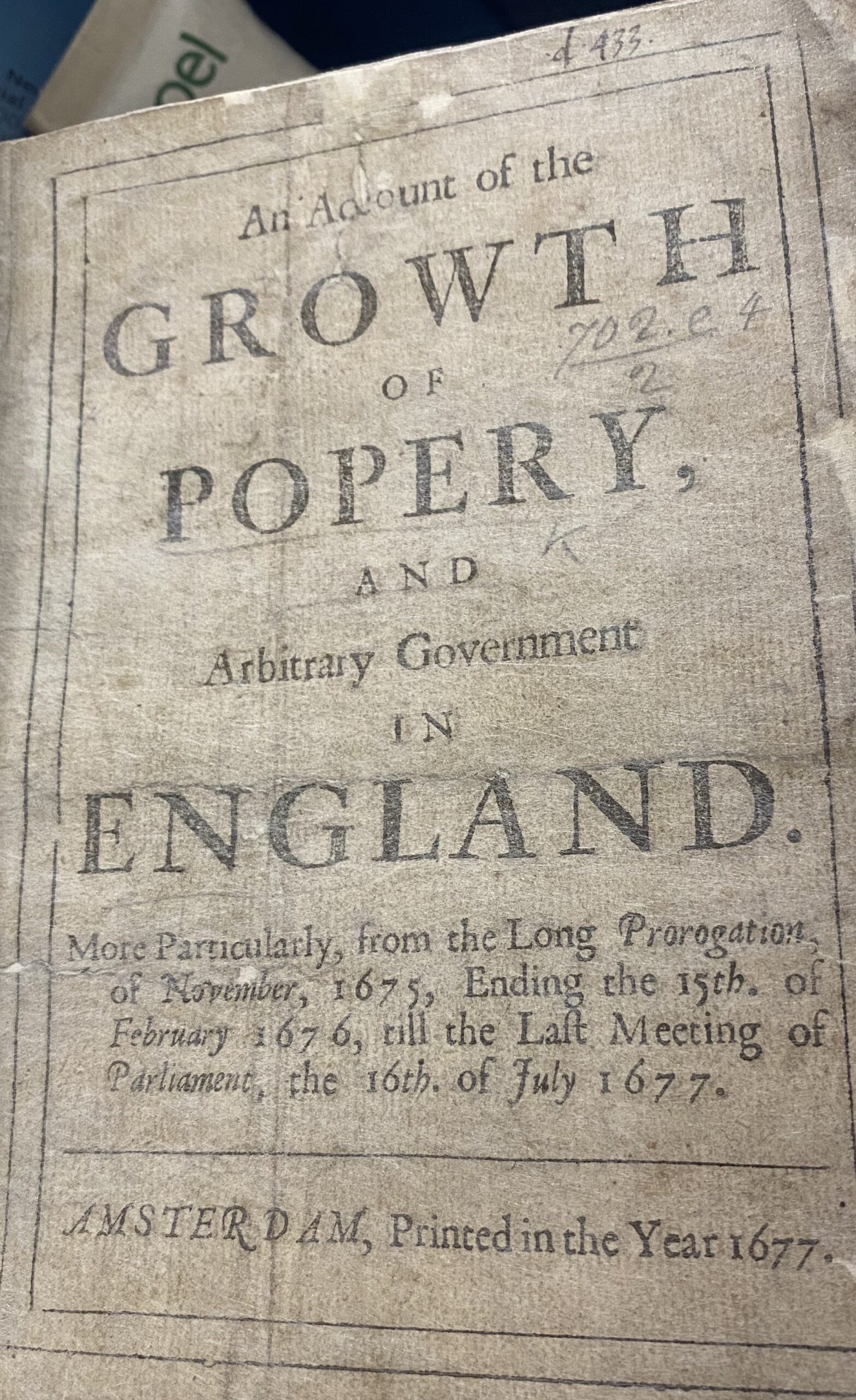
An Account of the
GROWTH
of
POPERY,
AND
Arbitrary Government
IN
ENGLAND.
More Particularly, from the Long Prorogation,
of November, 1675, Ending the 15th. of
February 1676, till the Last Meeting of
Parliament, the 16th. of July 1677.
AMSTERDAM, Printed in the Year 1677.
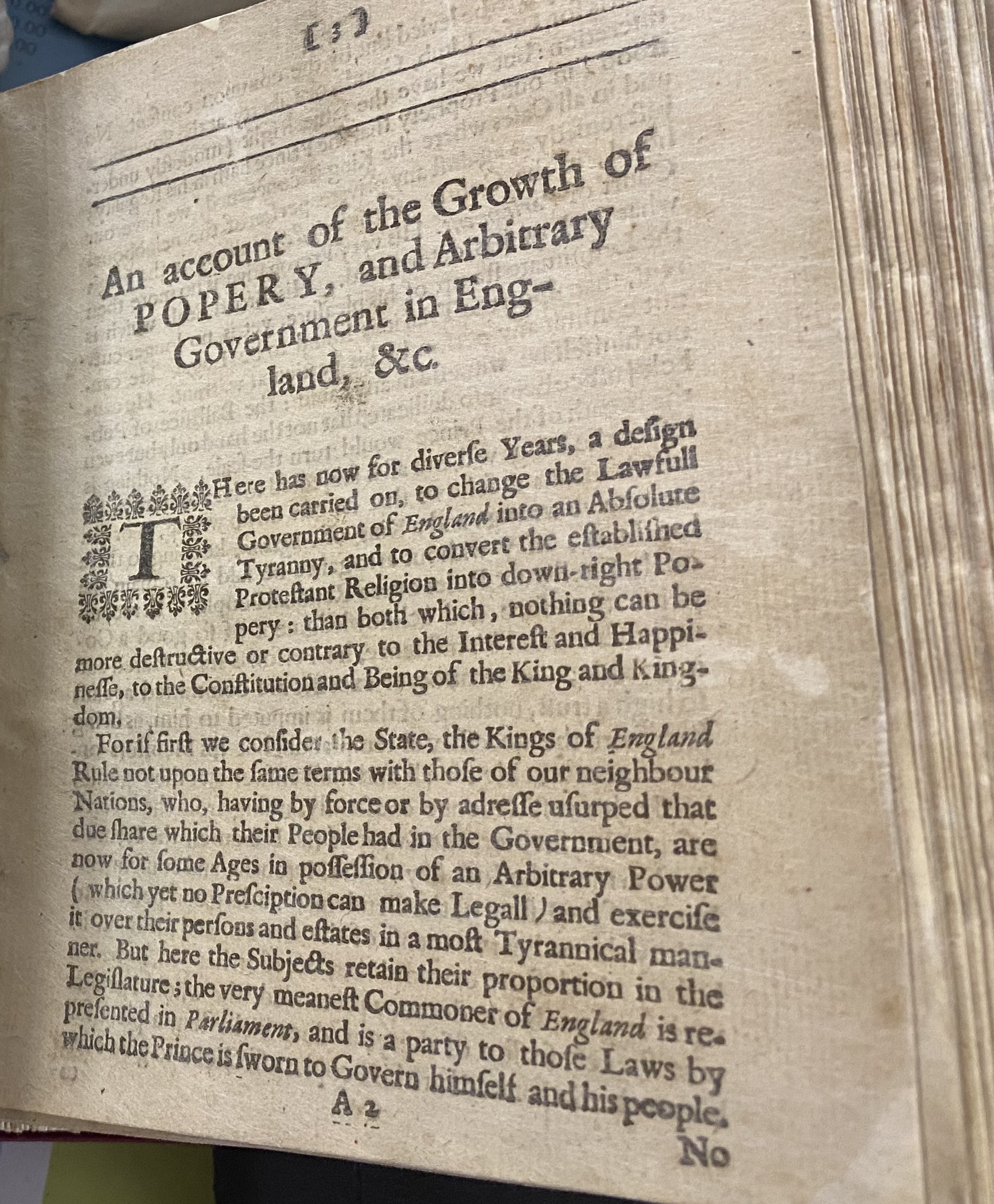
[3]
An account of the Growth of
POPERY, and Arbitrary
Government in Eng-
land, &c.
THere has now for diverse Years, a design
been carried on, to change the Lawfull
Government of England into an Absolute
Tyranny, and to convert the established
Protestant Religion into down-right Po-
pery: than both which, nothing can be
more destructive or contrary to the Interest and Happi-
nesse, to the Constitution and Being of the King and King-
dom.
For if first we consider the State, the Kings of England
Rule not upon the same terms with those of our neighbour
Nations, who, having by force or by adresse usurped that
due share which their People had in the Government, are
now for some Ages in possession of an Arbitrary Power
( which yet no Prescription can make Legall) and exercise
it over their persons and estates in a most Tyrannical man-
ner. But here the Subjects retain their proportion in the
Legislature; the very meanest Commoner of England is re-
presented in Parliament, and is a party to those Laws by
which the Prince is sworn to Govern himself and his people.
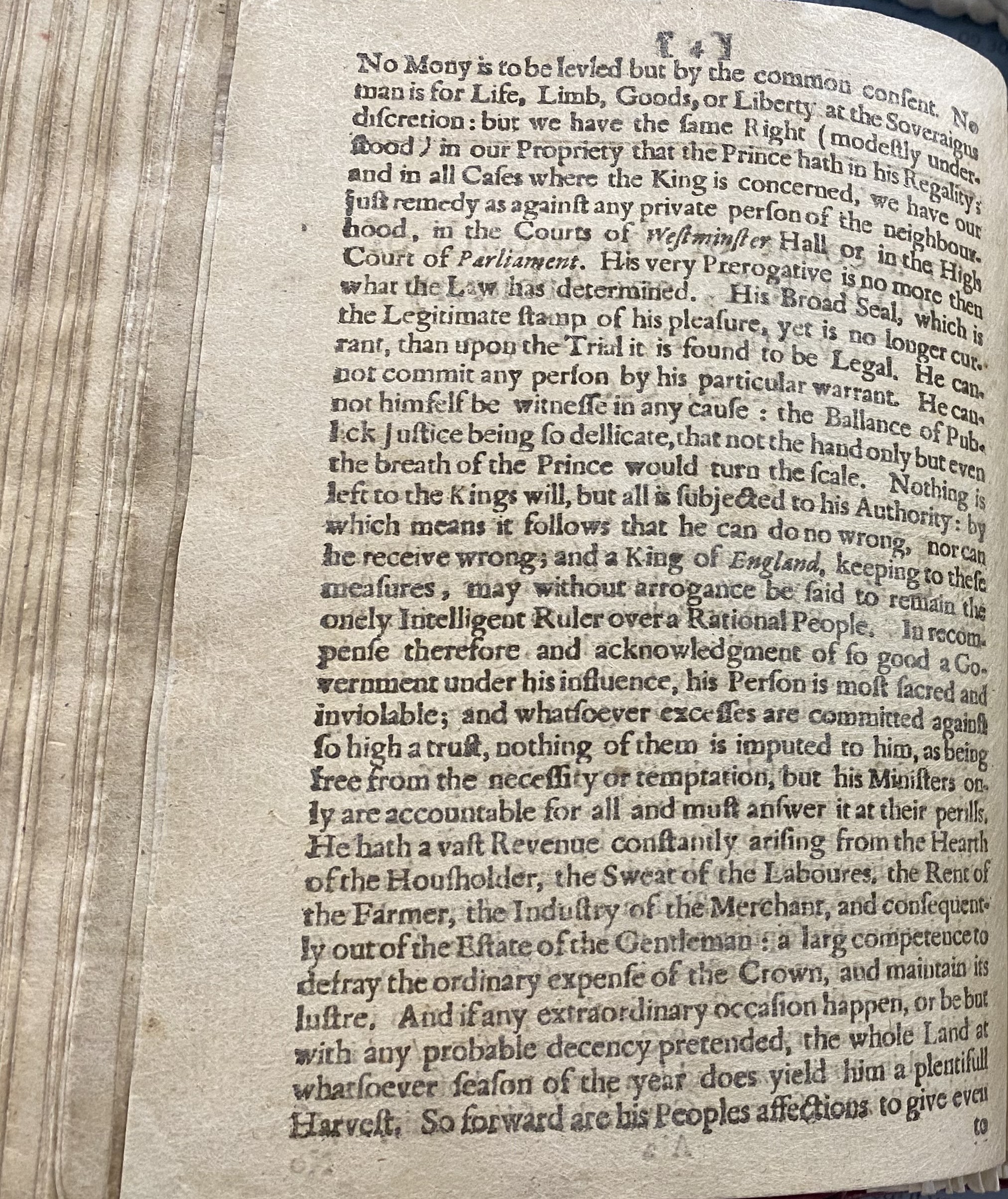
[4]
No Mony is to be levled but by the common consent. No
man is for Life, Limb, Goods, or Liberty at the Soveraigns
discretion: but we have the same Right ( modestly under-
slood ) in our Propriety that the Prince hath in his Regality;
and in all Cases where the King is concerned, we have our
just remedy as against any private person of the neighbour-
hood, in the Courts of Westminster Hall or in the High
Court of Parliament. His very Prerogative is no more then
what the Law has determined. His Broad Seal, which is
the Legitimate stamp of his pleasure, yet is no longer cur-
rant, than upon the Trial it is found to be Legal. He can-
not commit any person by his particular warrant. He can-
not himself be witnesse in any cause: the Ballance of Pub-
lick Justice being so dellicate, that not the hand only but even
the breath of the Prince would turn the scale. Nothings is
left to the Kings will, but all is subjected to his Authority: by
which means it follows that he can do no wrong, nor can
he receive wrong; and a King of England, keeping to these
measures, may without arrogance be said to remain the
onely Intellegent Ruler over a Rational People. In recom-
pense therefore and acknowledgment of so good a Go-
vernment under his influence, his Person is most sacred and
inviolable; and whatsoever excesses are committed against
so high a trust, nothing of them is imputed to him, as being
free from the necessity or temptation, but his Ministers on-
ly are accountable for all and must answer it at their perills.
He hath a vast Revenue constantly arising from the Hearth
of the Householder, the Sweat of the Laboures, the Rent of
the Farmer, the Industry of the Merchant, and consequent-
ly out of the Estate of the Gentleman: a larg competence to
detray the ordinary expense of the Crown, and maintain its
lustre. And if any extraordinary occasion happen, or be but
with any probable decency pretended, the whole Land at
whatsoever season of the year does yielld him a plentifull
Harvest, So forward are his Peoples affections to give even
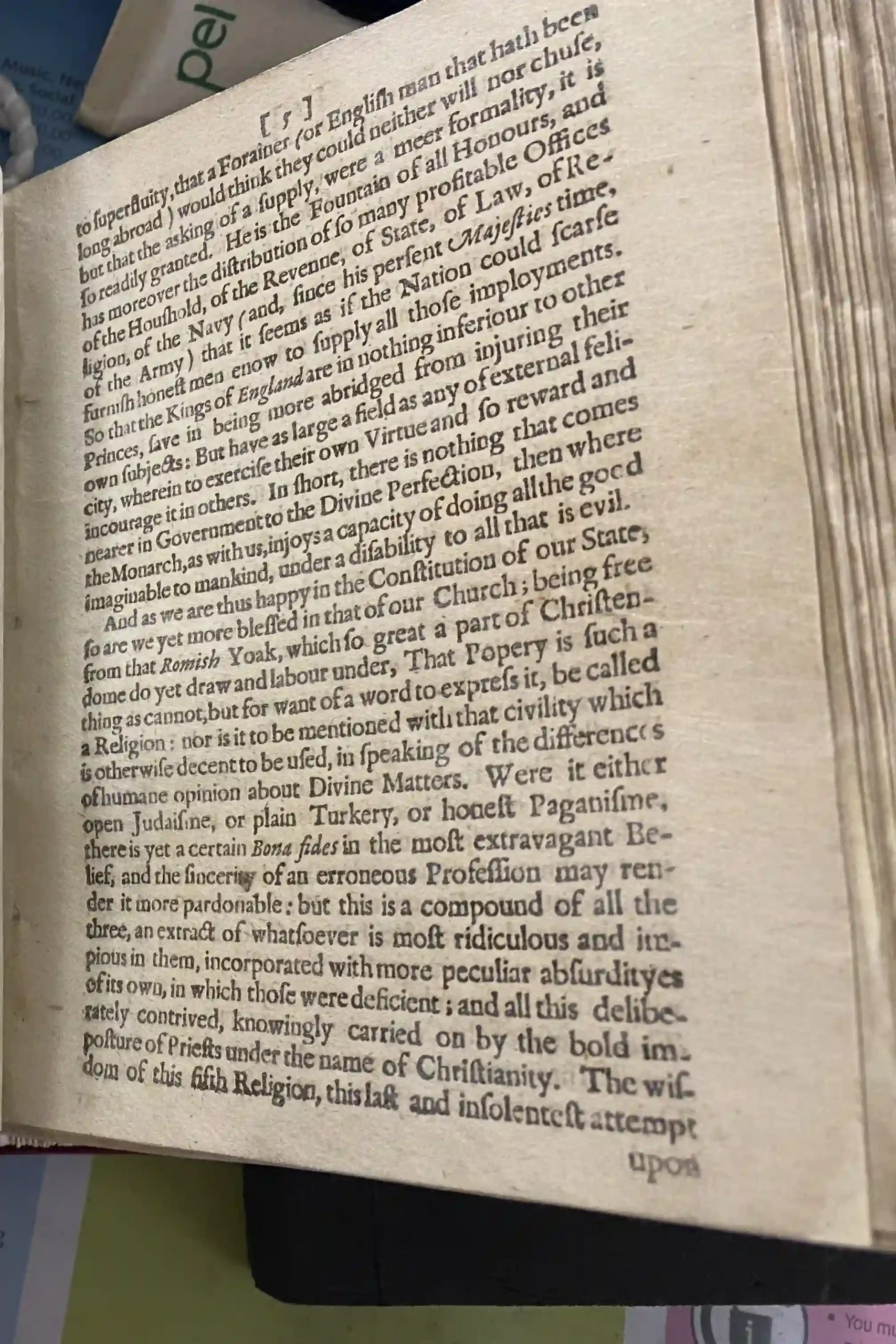
[5]
to superfluity, that a Forainer (or English man that hath been
long aboard) would think they could neither will nor chuse,
but that the asking of a supply, were a meer formality, it is
so readily granted. He is the Fountain of all Honours, and
has moreover the distribution of so many profitable Offices
of the Houshold, of the Revenue, of State, of Law, and Re-
ligion, of the Navy (and, since his persent Majesties time,
of the Army) that it seems as if the Nation could scarse
furnish honest men enow to supply all those imployments.
So that the Kings of England are in nothing inferiour to other
Princes, save in being more abridged from injuring their
own subjects: But have as large a field as any of external feli-
city, wherein to exercise their own Virtue and so reward and
incourage it in others. In short there is nothing that comes
nearer in Government to the Divine Perfection, then where
the Monarch, as with us, injoys a capacity of doing all the good
imaginable to mankind, under a disability to all that is evil.
And as we are thus happy in the Constitution of our State,
so are we yet more blessed in that of our Church; being free
from that Romish Yoak, which so great a part of Christen-
dome do yet draw and labour under, That Popery is such a
thing as cannot, but for what of a word to express it, be called
a Religion: nor it is to be mentioned with that civility which
is otherwise decent to be used, in speaking of the differences
of humane opinion about Divine Matters. Were it either
open Judaisme, or plain Turkery, or honest Paganisme,
there is yet a certain Bona fides in the most extravagant Be-
lief, and the sincerity of an erroneous Profession may ren-
der it more pardonable: but this is a compound of all the
three, an extract of whatsoever is most ridiculous and im-
pious in them, incorporated with more peculiar absurdityes
of its own, in which those were deficient; and all this delibe-
rately contrived, knowingly carried on by the bold im-
posture of Priests under the name of Christianity. The wis-
dom of this fifth Religion, this last and insolentest attempt
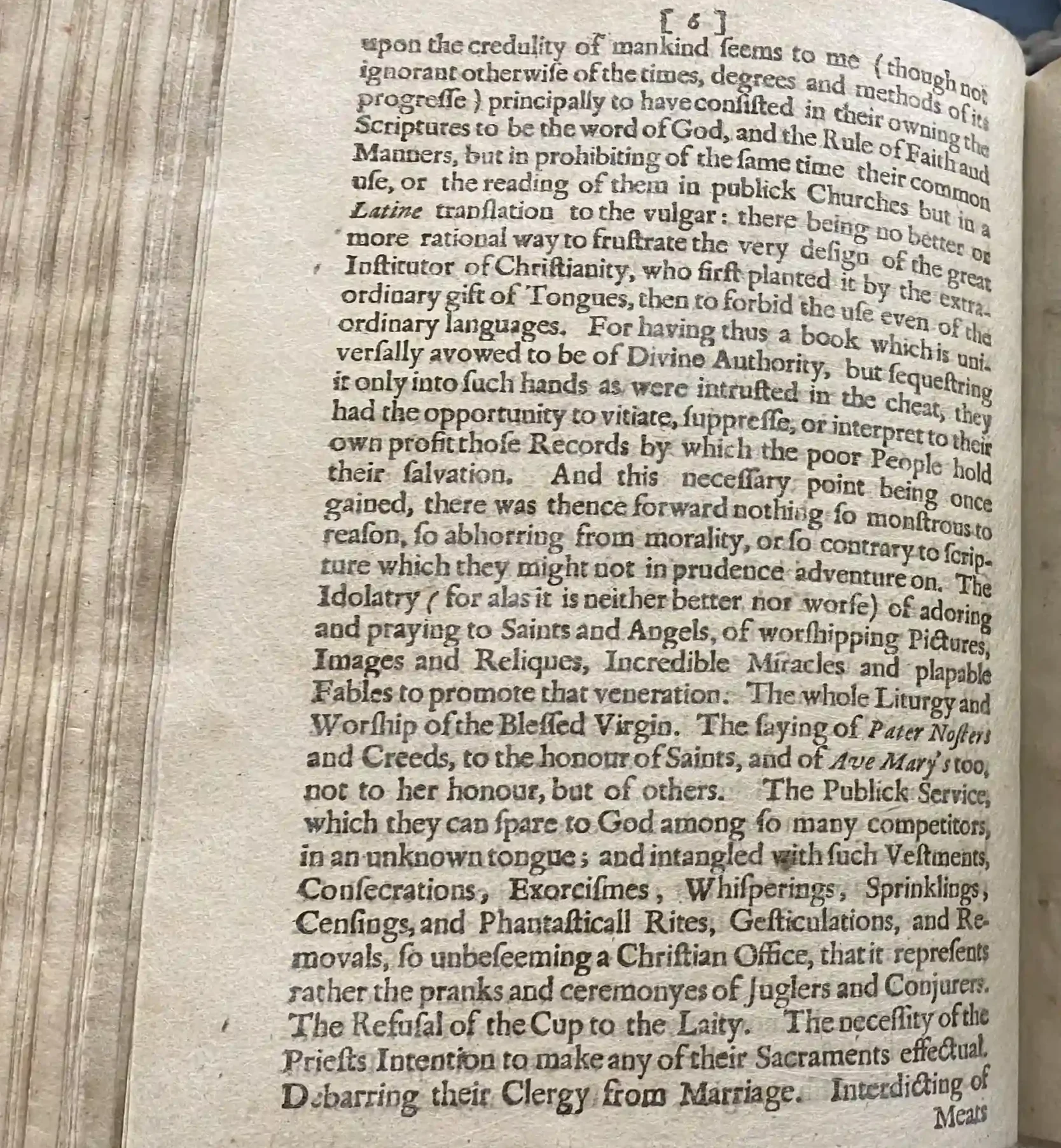
[6]
upon the credulity of mankind seems to me (though not
ignorant otherwise of the times, degrees and methods of its
progresse) principally to have consisted in their owning the
Scriptures to be the word of God, and the Rule of Faith and
Manners, but in prohibiting of the same time their common
use, or the reading of them in publick Churches but in a
Latine translation to the vulgar: there being no better or
more rational way to frustrate the very design of the great
Institutor of Christianity, who first planted it by the extra-
ordinary gift of Tongues, then to forbid the use even of the
ordinary languages. For having thus a book which is uni-
versally avowed to be of Divine Authority, but sequestering
it only into such hands as were instructed in the cheat, they
had the opportunity to vitiate, suppresse, or interpret to their
own profit those Records by which the poor People hold
their salvation. And this necessary point being once
gained, there was thence forward nothing so monstrous to
reason, so abhorring from morality, or so contrary to scrip-
ture which they might not in prudence adventure on. The
Idolatry (for alas it is neither better nor worse) of adoring
and praying to Saints and Angels, of worshipping Pictures,
Images, and Reliques, Incredible Miracles and plapable
Fables to promote that veneration. The whole Liturgy and
Worship of the Blassed Virgin. The saying of Pater Nosters
and Creeds, to the honour of Saints, and of Ave Mary`s too,
not to her honour, but to others. The Publick Service,
which they can spare to God among so many competitors,
in an unknown tongue: and intangled with such Vestments,
Consecrations, Exorcismes, Whisperings, Sprinklings,
Censings, and Phantasticall Rites, Gesticulations, and Re-
movals, so unbeseeming a Christian Office, that it represents
rather the pranks and ceremonyes of Juglers and Conjurers.
The Refusal of the Cup of the Laity. The necessity of the
Priests Intention to make any of their Sacraments effectual.
Debarring their Clergy from Marriage. Interdicting of
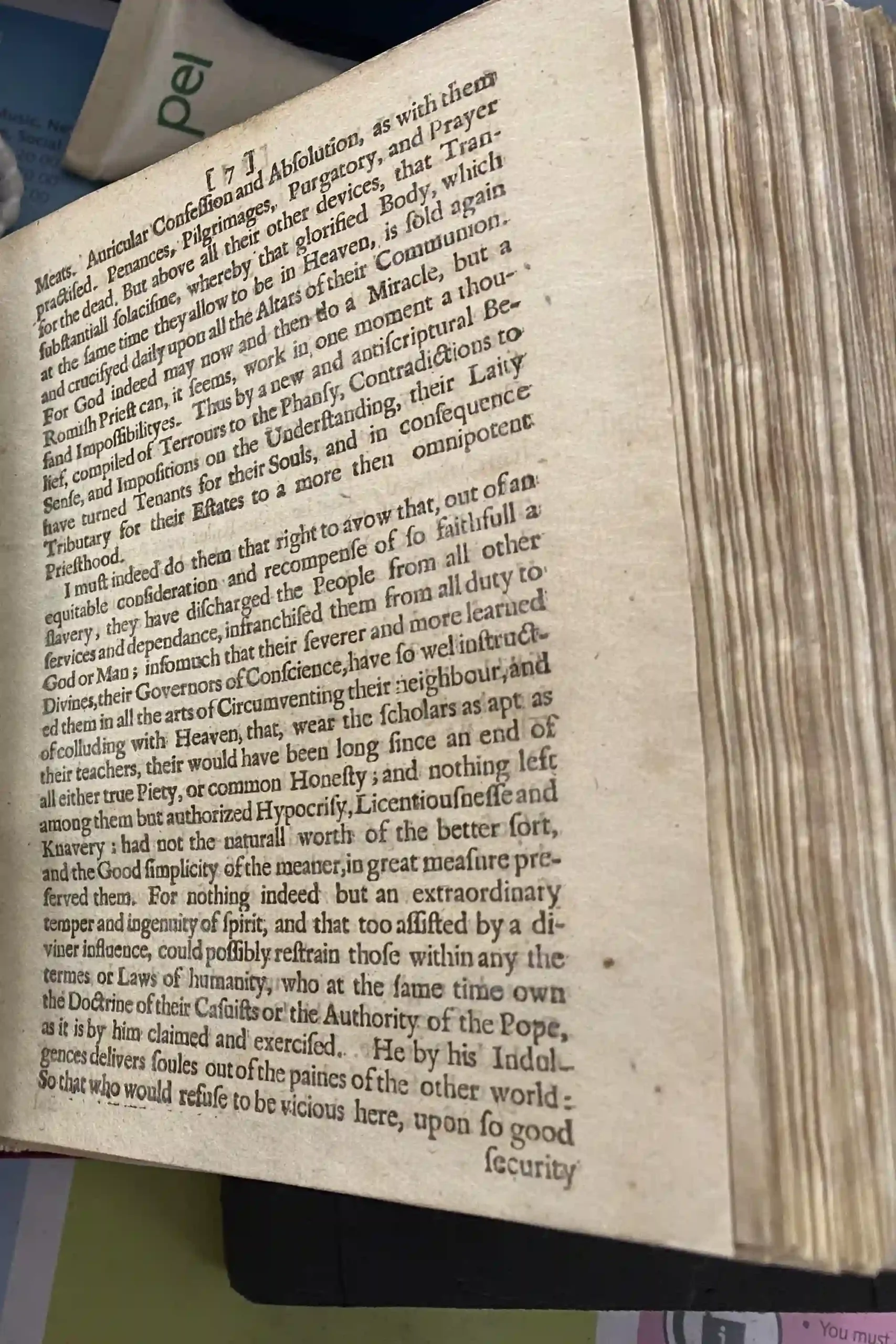
[7]
Meats. Auricular Confession of Absolution, as with them
practised. Penances, Pilgrimages, Purgatory, and Prayer
for the dead. But above all their other devices, that Tran-
substantiall solacisme, whereby that glorified Body, which
at the same time they allow to be in Heaven, is sold again
and crucifyed daily upon all the Altars of their Communion.
For God indeed may now and then do a Miracle, but a
Romish Priest can, it seems, work in one moment a thou-
sand Impossibilityes. Thus by a new and antiscriptural Be-
lief, compiled of Terrours of the Phansy, Contradictions to
Sense, and Impositions on the Understanding, their Laity
have turned Tenants for their Souls, and in consequence
Tributary for their Estates to a more then omnipotent
Priesthood.
I must indeed do them that right to avow that, out of an
equitable consideration and recompense of so faithfull a
slavery, they have discharged the People from all other
services and dependance, infranchised them from all duty to
God or Man; insomuch that their severer and more learned
Divines, their Governors of Conscience, have so wel instruct-
ed them in all the arts of Circumventing their neighbour, and
of colluding with Heaven, that, wear the scholars as apt as
their teachers, their would have been long since an end of
all either true Piety, or common Honesty; and nothing left
among them but authorized Hypocrisy, Licentiousnesse and
Knavery: had not the naturall worth of the better sort,
and the Good simplicity of the meaner, in great measure pre-
served them. For nothing indeed but an extraordinary
temper and ingenuity of spirit, and that too assisted by a di-
viner influence, could possibly restrain those within any the
termes or Laws of humanity, who at the same time own
the Doctrine of their Casuists or the Authority of the Pope,
as it is by him claimed and exercised. He by his Indul-
gences delivers soules out of the paines of the other world:
So that who would refuse to be vicious here, upon so good
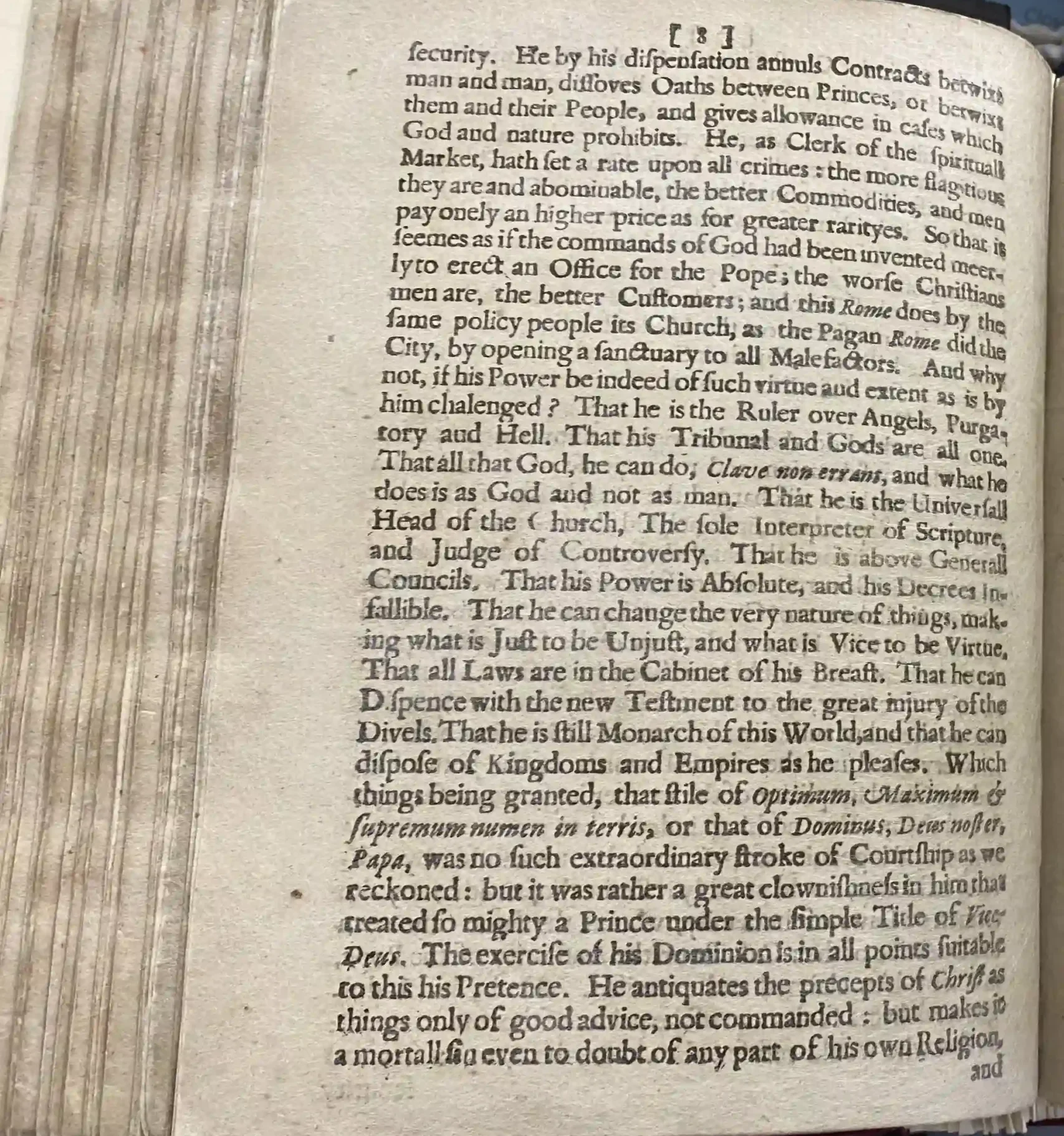
[8]
security. He by his dispensation annuls Contacts betwixt
man and man, dissoves Oaths between Princes, or betwixt
them and their People, and gives allowance in cases which
God and nature prohibits. He, as Clerk of the spirituall
Market, hath set a rate upon all crimes: the more flagitious
they are and abominable, the better Commodities, and men
pay onely an higher price as for greater rarityes. So that it
seemes as if the commands of God had been invented meer-
ly to erect an Office for the Pope; the worse Christians
men are, the better Customers; and this Rome does by the
same policy people its Church, as the Pagan Rome did the
City, by opening a sanctuary to all Malefactors. And why
not, if his Power be indeed of such virtue and extent as is by
him chalenged? That he is the Ruler over Angels, Purga-
tory and Hell. That his Tribunal and Gods are all one.
That all that God, he can do, Clave non errant, and what he
does is as God and not as man. That he is the Universall
Head of the Church, The sole Interpreter of Scripture,
and Judge of Controversy. That he is above Generall
Councils. That his Power is Absolute, and his Decrees in-
fallible. That he can change the very nature of things, mak-
ing what is Just to be Unjust, and what is Vice to be Virtue.
That all Laws are in the Cabinet of his Breast. That he can
Dispence with the new Testment to the great injury of the
Divels. That he is still Monarch of this World, and that he can
dispose of Kingdoms and Empires as he pleases. Which
things being granted, that stile of Optimum, Maximum &
Supremum numen in terris, or that of Dominus, Deus noster,
Papa, was no such extraordinary stroke of Courtship as we
reckoned: but it was rather a great clownishness in him that
treated so mighty a Prince under the simple Title of Vicc-
Deus. The exercise of his Dominion is in all points suitable
to this his Pretence. He antiquates the precepts of Christ as
things only of good advice, not commanded: but makes in
a mortall sin even to doubt any part of his own Religion,
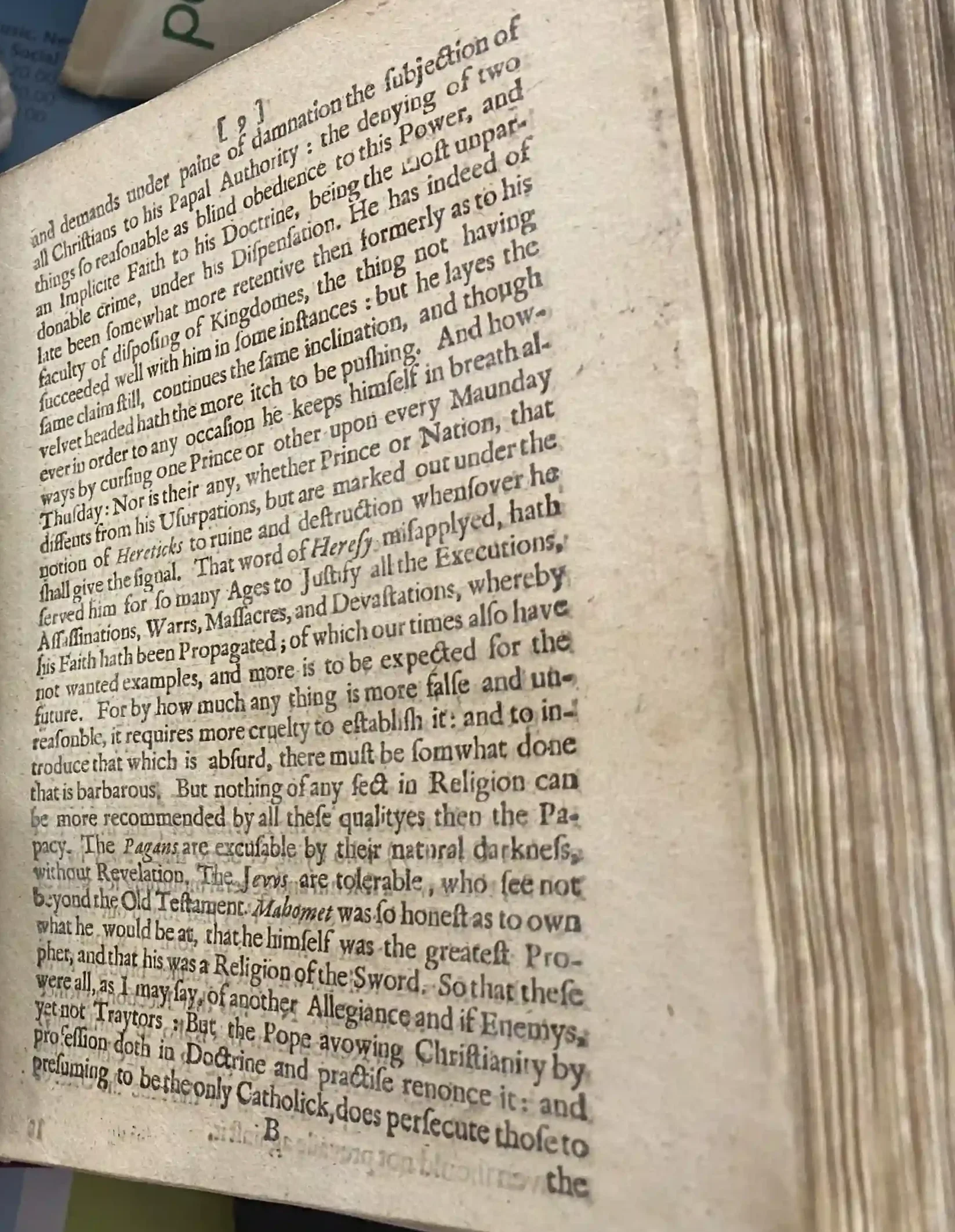
[9]
and demands under paine of damnation the subjection of
all Christians to his Papal Authority: the denying of two
things so reasonable as blind obedience to this Power, and
an Implicite Faith to his Doctrine, being the most unpar-
donable crime, under his Dispensation. He has indeed of
late been somewhat more retentive then formerly as to his
faculty of disposing of Kingdomes, the thing not having
succeeded well with him in some instances: but he layes the
same claim still, continues the same inclination, and though
velvet headed hath the more itch to be pushing. And how-
ever in order to any occasion he keeps himself in breath al-
ways by cursing one Prince or other upon every Maunday
Thursday: Nor is their any, whether Prince or Nation, that
dissents from his Usurpations, but are marked out under the
notion of Hereticks to ruine and destruction whensover he
shall give the signal. That word of Heresy misapplyed, hath
served him for so many Ages to Justify all the Executions,
Assassinations, Warrs, Massacres, and Devastations, whereby
his Faith hath been Propogated; of which our times also have
not wanted examples, and more is to be expected for the
future. For by how much any thing is more false and un-
reasonble, it requires more cruelty to establish it: and to in-
troduce that which is absurd, there must be somwhat done
that is barbarous. But nothing of any sect in Religion can
be more recommended by all these qualityes then the Pa-
pacy. The Pagans are excusable by their natural darkness,
without Revelation. The Jews are tolerable, who see not
beyond the Old Testament. Mahomet was so honest as to own
what he would be at, that he himself was the greatest Pro-
phet, and that his was a Religion of the Sword. So that these
were all, as I may say, of another Allegiance and if Enemys,
yet not Traytos : But the Pope avowing Christianity by
profession doth in Doctrine and practice renonce it: and
presuming to be the only Catholick, does persecute those to
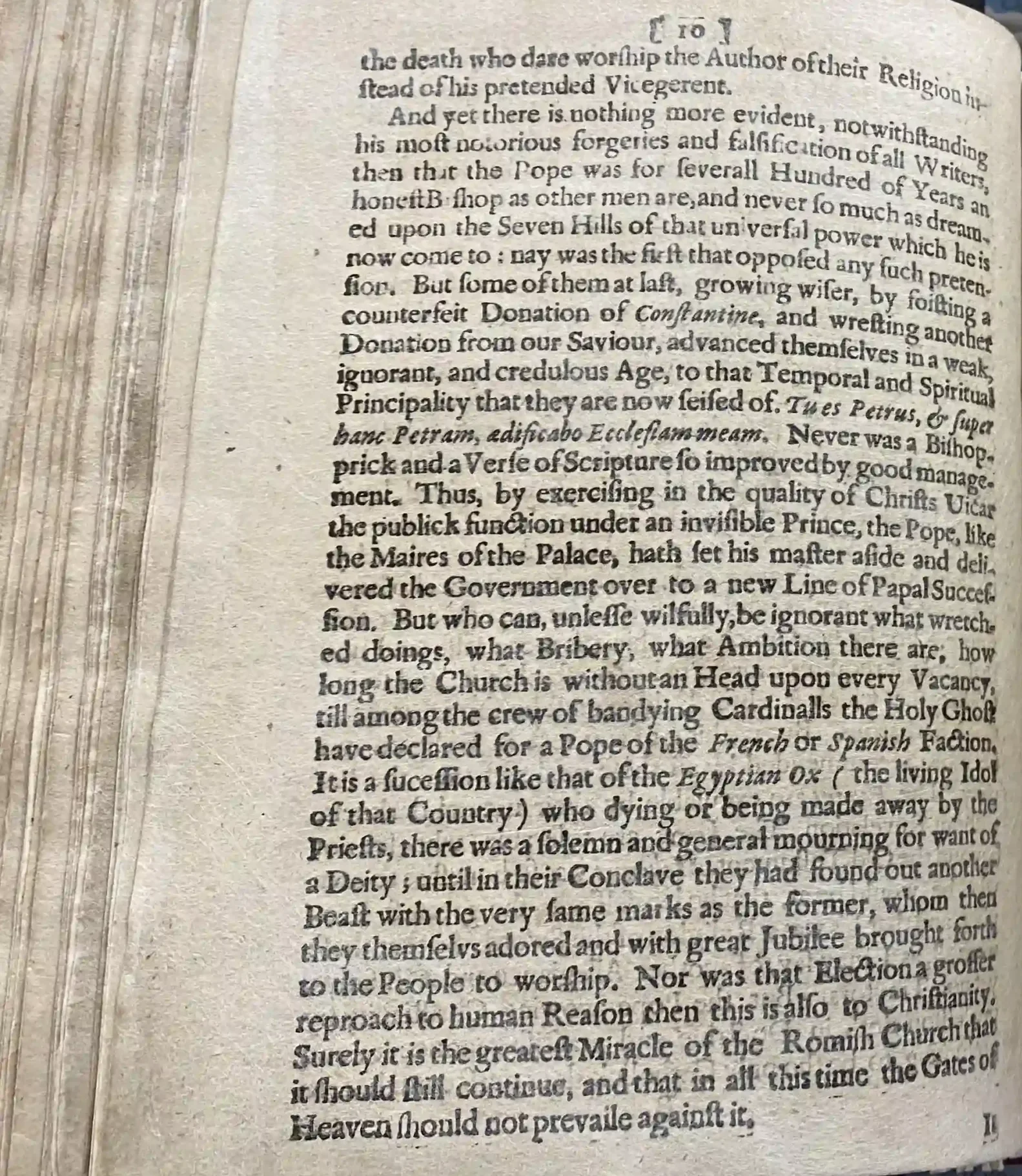
[10]
the death who dare worship the Author of their Religion in-
stead of his pretended Vicegerent.
And yet there is nothing more evident, notwithstanding
his most notorious forgeries and falsification of all Writers,
then that the Pope was for severall Hundred of Years an
honest Bishop as other men are, and never so much as dream-
ed upon the Seven Hills of that universal power which he is
now come to: nay was the first that opposed any such preten-
sion. But some of them at last, growing wiser, by foisting a
counterfeit Donation of Constantine, and wresting another
Donation from our Saviour, advanced themselves in a weak,
ignorant, and credulous Age, to that Temporal and Spiritual
Principality that they are now seised of. Tu es Petrus, & Super
banc Petram, adificabo Ecclesiam meam. Never was a Bishop-
prick and a Verse of Scripture so improved by good manage-
ment. Thus, by exercising in the quality of Christs Vicar
the publick function under an invisible Prince, the Pope, like
the Maires of the Palace, hath set his master aside and deli-
vered the Government over to a new Line of Papal Succes-
sion. But who can, unlesse wilfully, be ignorant what wretch-
ed doings, what Bribery, what Ambition there are, how
long the Church is without an Head upon every Vacancy,
till among the crew of bandying Cardinalls the Holy Ghost
have declared for a Pope of the French or Spanish Faction.
It is a sucession like that of the Egyptian Ox (the living Idol
of that Country) who dying or being made away by the
Priests, there was a solemn and general mourning for want of
a Deity; until in their Conclave they had found out another
Beast with the very same marks as the former, whom then
they themselvs adored and with great Jubilee brought forth
to the People to worship. Nor was that Election a grosser
reproach to human Reason then this is also to Christianity.
Surely it is the greatest Miracle of the Romish Church that
it should still continue, and that all this time the Gates of
Heaven should not prevaile against it.
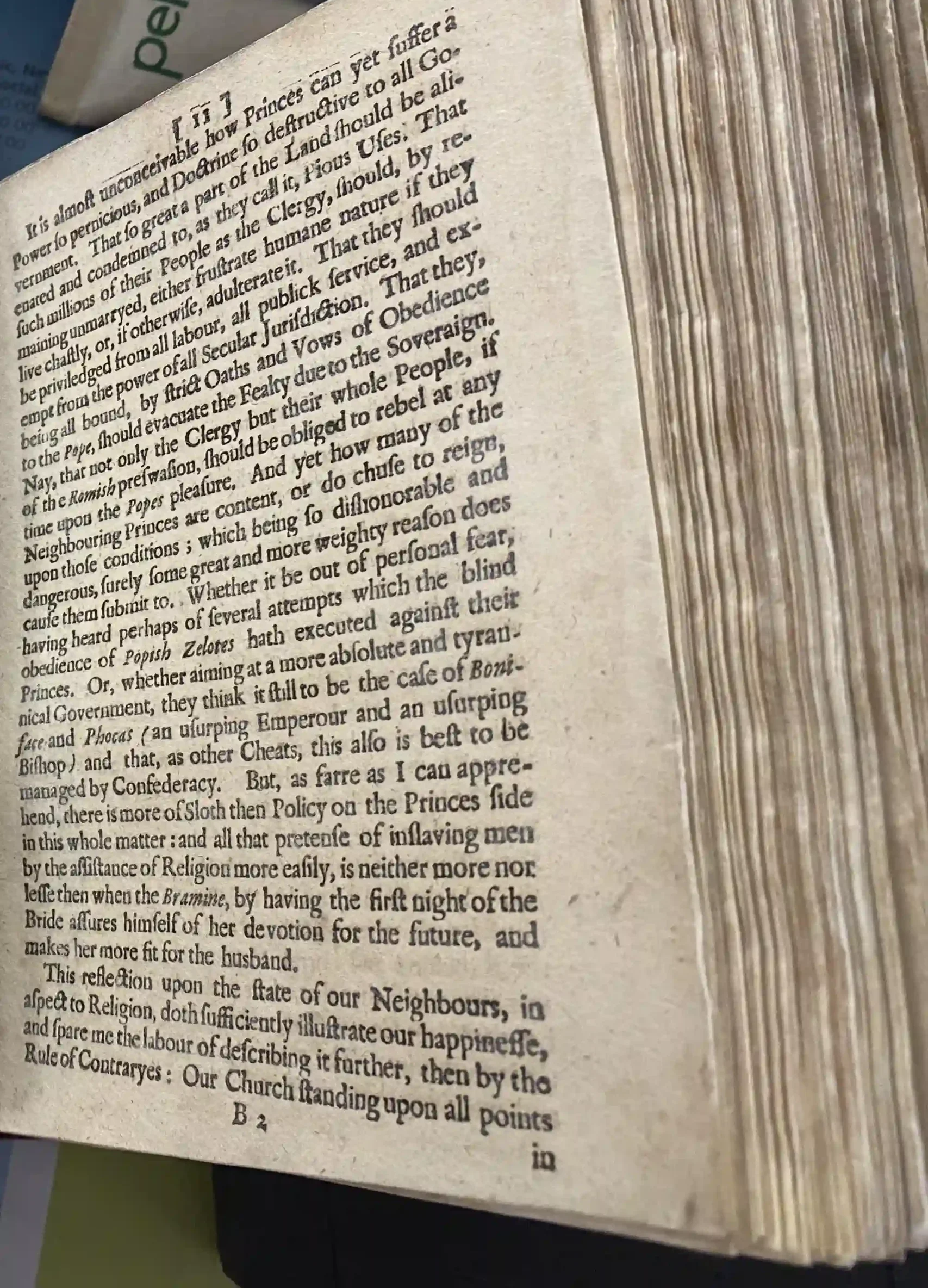
[11]
It is almost unconceivable how Princes can yet suffer a
Power so pernicious, and Doctrine so destructive to all Go-
vernment. That so great a part of the Land should be ali-
enated and condemned to, as they call it, Hous Uses. That
such millions of their People as the Clergy, should, by re-
maining unmarryed, either frustrate humane nature if they
live chastly, or, if otherwise, adulterate it. That they should
be priviledged from all labour, all publick service, and ex-
empt from the power of all Secular Jurisdiction. That they,
being all bound, by strict Oaths and Vows of Obedience
to the Pope, should evacuate the Fealty due to the Soveraign.
Nay, that not only the Clergy but their whole People, if
of the Romish preswasion *persuasion, should be obliged to rebel at any
time upon the Popes pleasure. And yet how many of the
Neighbouring Princes are content, or do chuse to reign,
upon those conditions; which being so dishonorable and
dangerous, surely some great and more weighty reason does
cause them submit to. Whether it be out of personal fear,
having heard perhaps of several attempts which the blind
obedience of Popish Zelotes hath executed against their
Princes. Or, whether aiming at a more absolute and tyran-
nical Government, they think it still to be the case of Boni-
face and Phocas (an usurping Emperour and an usurping
Bishop) and that, as other Cheats, this also is best to be
managed by Confederacy. But, as farre as I can appre-
hend, there is more of Sloth then Policy on the Princes side
in this whole matter: and all that pretense of inslaving men
by the assistance of Religion more easily, is neither more nor
lesse then when the Bramine, by having the first night of the
Bride assures himself of her devotion for the future, and
makes her more fit for the husband.
This reflection upon the state of our Neighbours, in
aspect to Religion, doth sufficiently illustrate our happinesse,
and spare me the labour of describing it further, they by the
Rule of Contraryes: Our Church standing upon all points
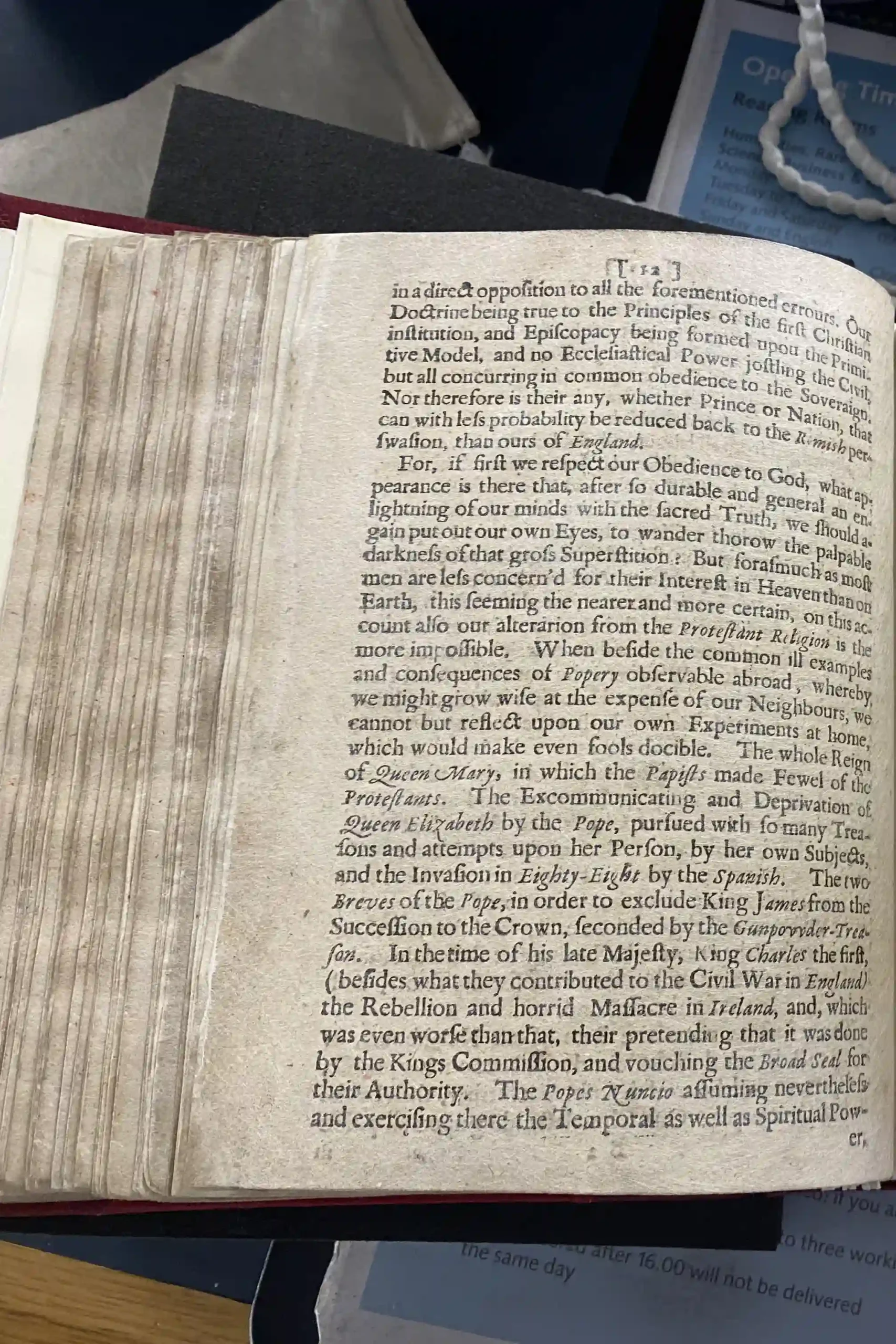
[12]
in a direct opposition to all the forementioned errours. Our
Doctrine being true to the Principles of the first Christian
institution, and Episcopacy being formed upon the Primi-
tive Model, and no Ecclesiastical Power jostling the Civil,
but all concurring in common obedience to the Soveraign.
Nore therefore is their any, whether Prince or Nation, that
can with less probability be reduced back to the Romish per-
swasion, than ours of England.
For, if first we respect our Obedience to God, what ap-
pearance is there that, after so durable and general an en-
lightning of our minds with the sacred Truth, we should a-
gain put our our own Eyes, to wander thorow the palpable
darkness of that gross Superstition: But forasmuch as most
men are less concern’d for their Interest in Heaven than on
Earth, this seeming the nearer and more certain, on this ac-
count also our alterarion from the Protestant Religion is the
more impossible. When beside the common ill examples
and consequences of Popery observable abroad, whereby
we might grow wise at the expense of our Neighbours, we
cannot but reflect upon our own Experiments at home,
which would make even fools docible. The whole Reign
of Queen Mary, in which the Papists made Fewel of the
Protestants. The Excommunicating and Deprivation of
Queen Elizabeth by the Pope, pursued with so many Trea-
sons and attempts upon her Person, by her own Subjects,
and Invasion in Eighty-Eight by the Spanish. The two
Breves of the Pope, in order to exclude King James from the
Succession to the Crown, seconded by the Gunpowder-Trea-
son. In the time of his late Majesty, King Charles the first,
(besides what they contributed to the Civil War in England)
the Rebellion and horrid Massacre in Ireland, and, which
was even worse than that, their pretending that it was done
by the Kings Commission, and vouching the Broad Seal for
their Authority. The Popes Nuncio assuming nevertheless
and exercising there the Temporal as well as Spiritual Pow-
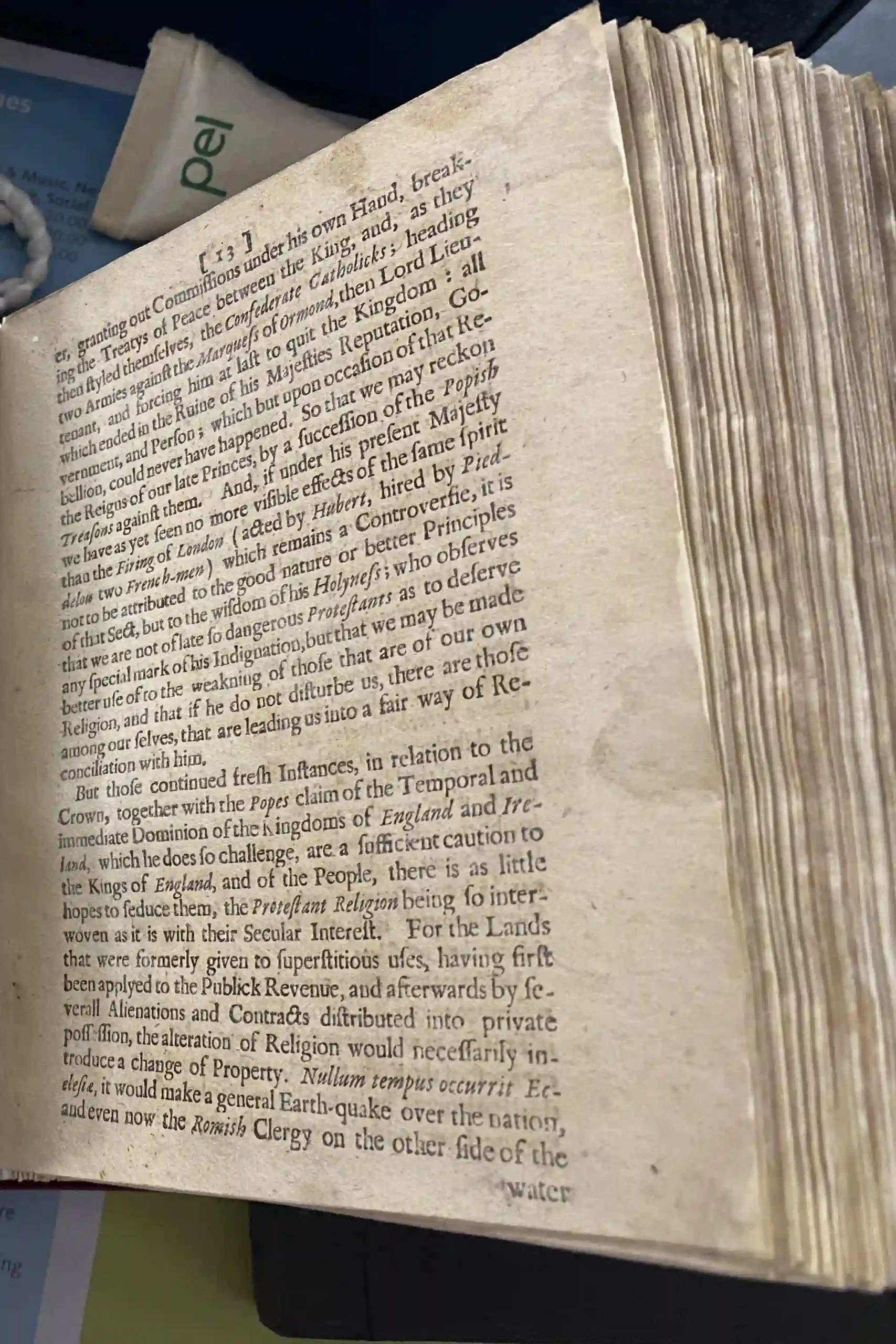
[13]
er, granting out Commissions under his own Hand, break-
ing the Treatys of Peace between the King, and, as they
then styled themselves, the Confederate Catholicks; heading
two Armies against the Marquess of Ormond, the Lord Lieu-
tenant, and forcing him at last to quit the Kingdom: all
which ended in the Ruine of his Majesties Reputation, Go-
vernment, and Person; which but upon occasion of that Re-
bellion, could never have happened. So that we may reckon
the Reigns of our late Princes, by a succession of the Popish
Treasons against them. And, if under his present Majesty
we have as yet seen no more visible effects of the same spirit
than the Firing of London (acted by Hubert, hired by Pied-
delon two French-men) which remains a Controversie, it is
not to be attributed to the good nature or better Principles
of that Sect, but to the wisdom of his Holyness; who observes
that we are not of late so dangerous Protestants as to deserve
any special mark of his Indignation, but that we may be made
better use of to the weakning of those that are of our own
Religion, and that if he do not disturbe us, there are those
among our selves, that are leading us into a fair way of Re-
conciliation with them.
But those continued fresh Instances, in relation to the
Crown, together with the Popes Claim of the Temporal and
immediate Dominion of the Kingdoms of England and Ire-
land, which he does so challenge, are a sufficient caution to
the Kings of England, and of the People, there is as little
hopes to seduce them, the Protestant Religion being so inter-
woven as it is with their Secular Interest. For the Lands
that were formerly given to superstitious uses, having first
been applyed to the Publick Revenue, and afterwards by se-
verall Alienations and Contracts distributed into private
possession, the alteration of Religion would necessarily in-
troduce a change of Property. Nullum tempus occurrit Ec-
elesiæ, it would make a general Earth-quake over the nation,
and even now the Romish Clergy on the other side of the
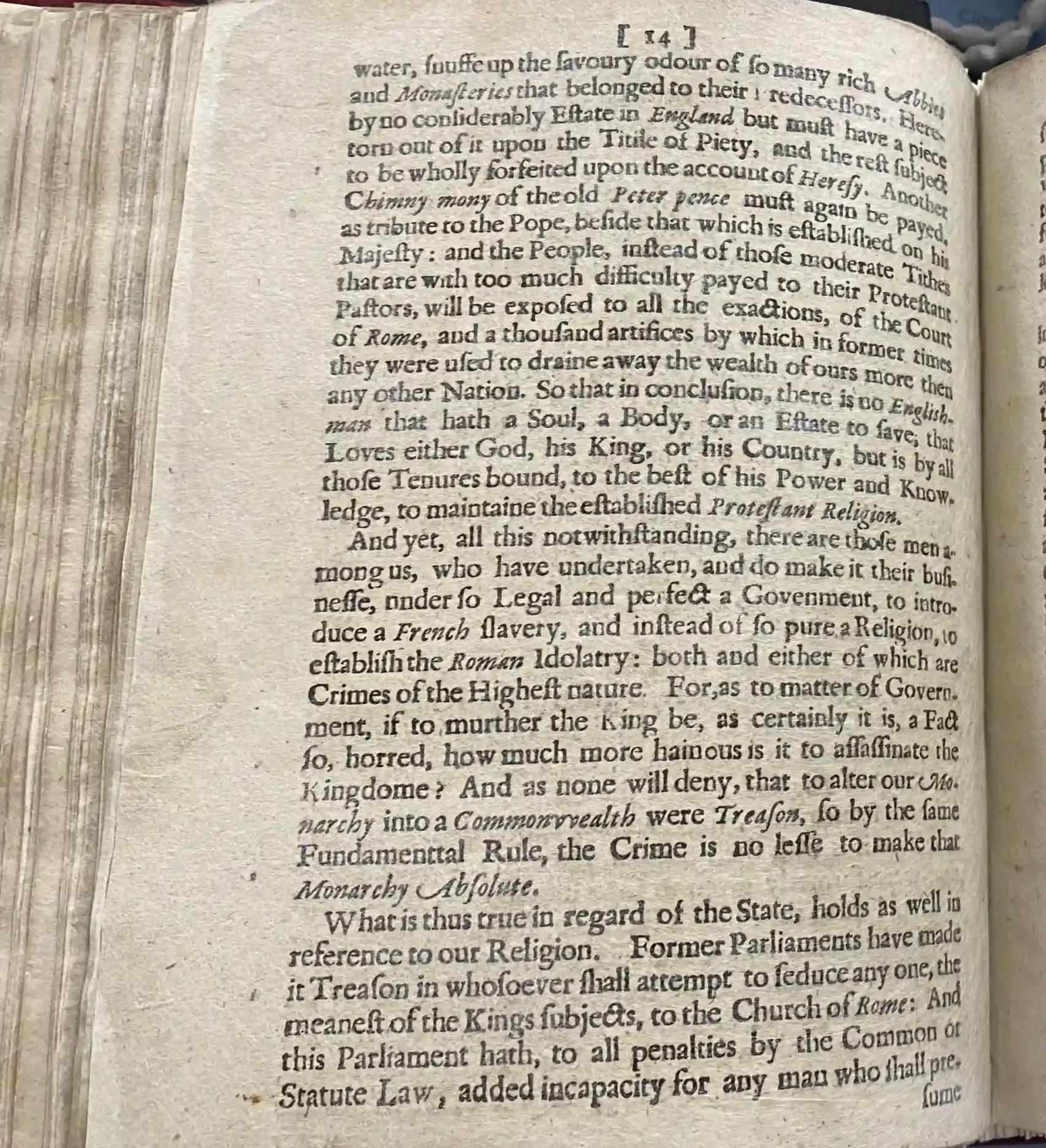
[14]
water, snuffe up the savoury odour of so many rich Abbies
and Monasteries that belonged to their Predecessors. Here-
by no considerably Estate in England but must have a piece
torn out of it upon the Title of Piety, and the rest subject
to be wholly forfeited upon the account of Heresy. Another
Chimny mony of the old Peter pence must again be payed,
as tribute to the Pope, beside that which is established on his
Majesty: and the People, instead of those moderate Tithes
that are with too much difficulty payed to their Protestant
Pastors, will be exposed to all the exactions, of the Court
of Rome, and a thousand artifices by which in former times
they were used to draine away the wealth of ours more then
any other Nation. So that in conclusion, there is no English-
man that hath a Soul, a Body or an Estate to save, that
Loves either God, his King, or his Country, but is by all
those Tenures bound, to the best of his Power and Know-
ledge, to maintaine the established Protestant Religion.
And yet, all this notwithstanding, there are those men a-
mong us, who have undertaken, and do make it their busi-
nesse, under so Legal and perfect a Govenment, to intro-
duce a French slavery, and instead of so pure a Religion, to
establish the Roman Idolatry: both and either of which are
Crimes of the Highest nature. For, as to matter of Govern-
ment, if to murther the King be, as certainly it is, a Fact
so, horred, how much more hainous is it to assassinate the
Kingdome? And as none will deny, that to alter our Mo-
narchy into a Commonwealth were Treason, so by the same
Fundamental Rule, the Crime is no lesse to make that
Monarchy Absolute.
What is thus true in regard of the State, holds as well in
reference to our Religion. Former Parliaments have made
it Treason in whosoever shall attempt to seduce any one, the
meanest of the Kings subjects, to the Church of Rome: And
this Parliament hath, to all penalties by the Common or
Statute Law, added incapacity for any man who shall pre-
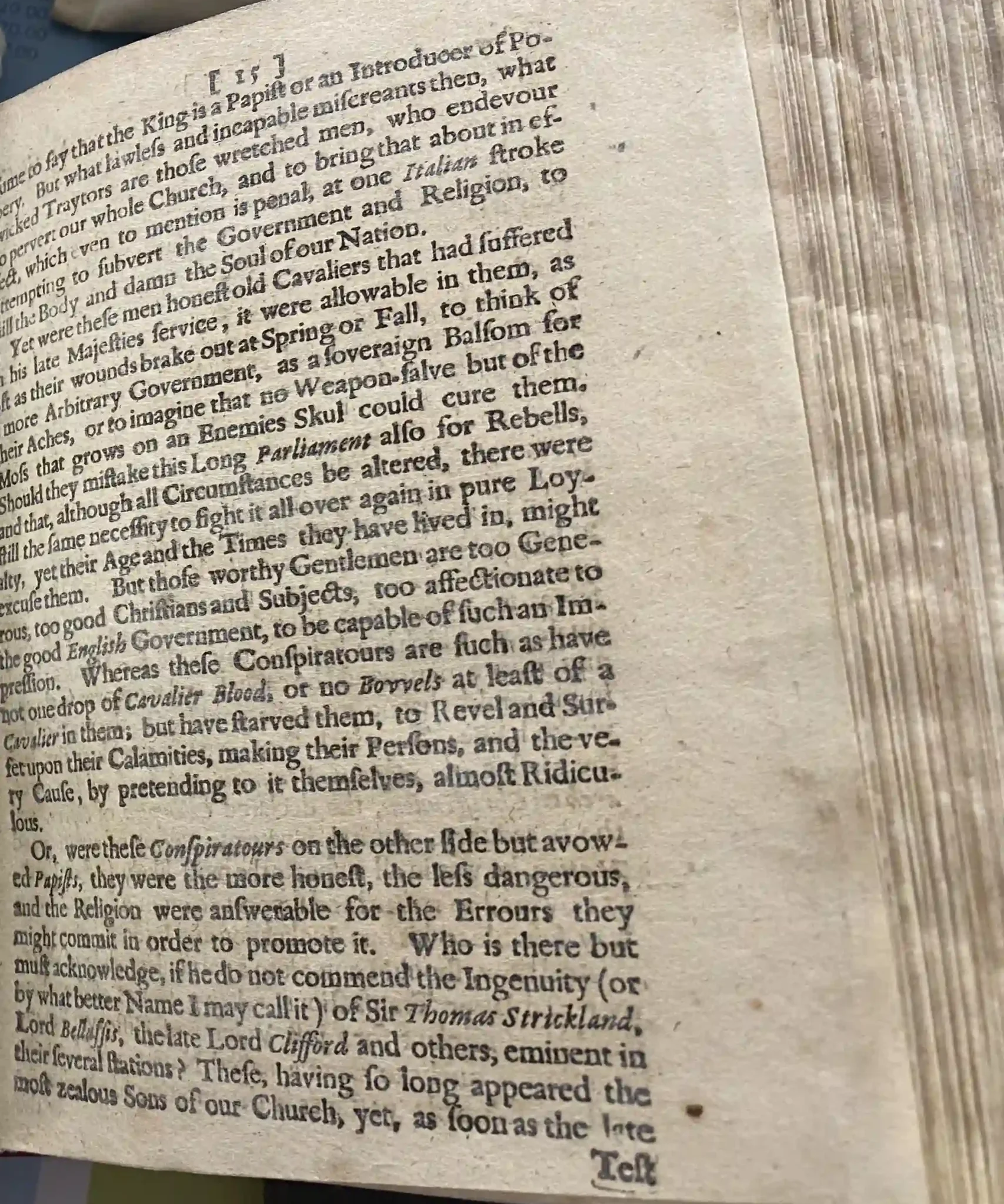
[15]
sume to say that the King is a Papist or an Introducer of Po-
pery. But what lawless and incapable miscreants then, what
wicked Traytors are those wretched men, who endevour
to pervert our whole Church, and to bring that about in ef-
fect, which even to mention is penal, at one Italian stroke
attempting to subvert the Government and Religion, to
kill the Body and damn the Soul of our Nation.
Yet were these men honest old Cavaliers that had suffered
in his late Majesties service, it were allowable in them, as
oft as their wounds brake out at Spring or Fall, to think of
a more Arbitrary Government, as a soveraign Balsom for
their Aches, or to imagine that no Weapon-salve but of the
Moss that grows on an Enemies Skul could cure them.
Should they mistake this Long Parliament also for Rebells,
and that, although all Circumstances be altered, there were
still the same necessity to fight it all over again in pure Loy-
alty, yet their Age and the Times they have lived in, might
excuse them. But those worthy Gentlemen are too Gene-
rous, too good Christians and Subjects, too affectionate to
the good English Government, to be capable of such an Im-
pression. Whereas these Conspiratours are such as have
not one drop of Cavalier Blood, or no Bowels at least of a
Cavalier in them; but have starved them, to Revel and Sur-
fet upon their Calamities, making their Persons, and the ve-
ry Cause, by pretending it to themselves, almost Ridicu-
lous.
Or, were these Conspiratours on the other side but avow-
ed Papists, they were the more honest, the less dangerous,
and the Religion were answerable for the Errours they
might commit in order to promote it. Who is there but
must acknowledge, if he do not commend the Ingenuity (or
by what better Name I may call it) of Sir Thomas Strickland,
Lord Bellassis, the late Lord Clifford and others, eminent in
their several stations? These, having so long appeared the
most zealous Sons of our Church, yet, as soon as the late
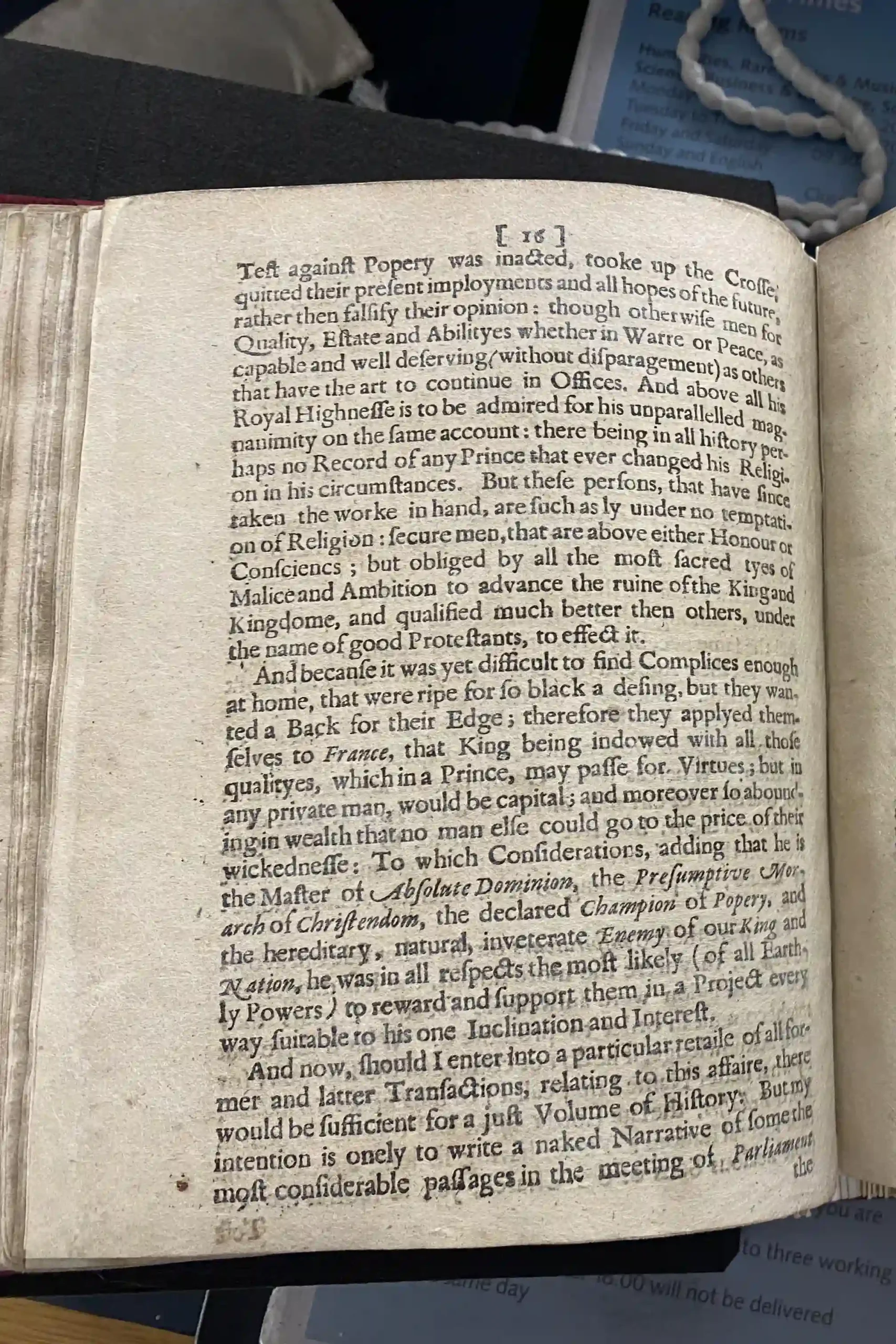
[16]
Test against Popery was inacted, tooke up the Crosse,
quitted their present imployments and all hopes of the future,
rather then falsify their opinion: though otherwise men for
Quality, Estate and Abilityes whether in Warre or Peace, as
capable and well deserving (without disparagement) as others
that have the art to continue in Offices. And above all his
Royal Highnesse is to be admired for his unparalled mag-
nanimity on the same account: there being in all history per-
haps no Record of any Prince that ever changed his Religi-
on in his circumstances. But these persons, that have since
taken the worke in hand, are such as ly under no temptati-
on of Religion: secure men, that are above either Honour or
Consciencs; but obliged by all the most sacred tyes of
Malice and Ambition to advance the ruine of the King and
Kingdome, and qualified much better then others, under
the name of good Protestants, to effect it.
And because it was yet difficult to find Complices enough
at home, that were ripe for so black a desing, but they wan-
ted a Back for their Edge; therefore they applyed them-
selves to France, that King being indowed with all those
qualityes, which in a Prince, may passe for Virtues; but in
any private man, would be capital; and moreover so abound-
ing in wealth that no man else could go to the price of their
wickednesse: To which Considerations, adding that he is
the Master of Absolute Dominion, the Presumptive Mon-
arch of Christendom, the declared Champion of Popery, and
the hereditary, natural, inverterate Enemy of our King and
Nation, he was in all respects the most likely (of all Earth-
ly Powers) to reward and support them in a Project every
way suitable to his one Inclination and Interest.
And now, should I enter into a particular retaile of all for-
mer and latter Transactions, relating to this affaire, there
would be sufficient for a just Volume of History. But my
intention is onely to write a naked Narrative of some the
most considerable passages in the meeting of Parliament
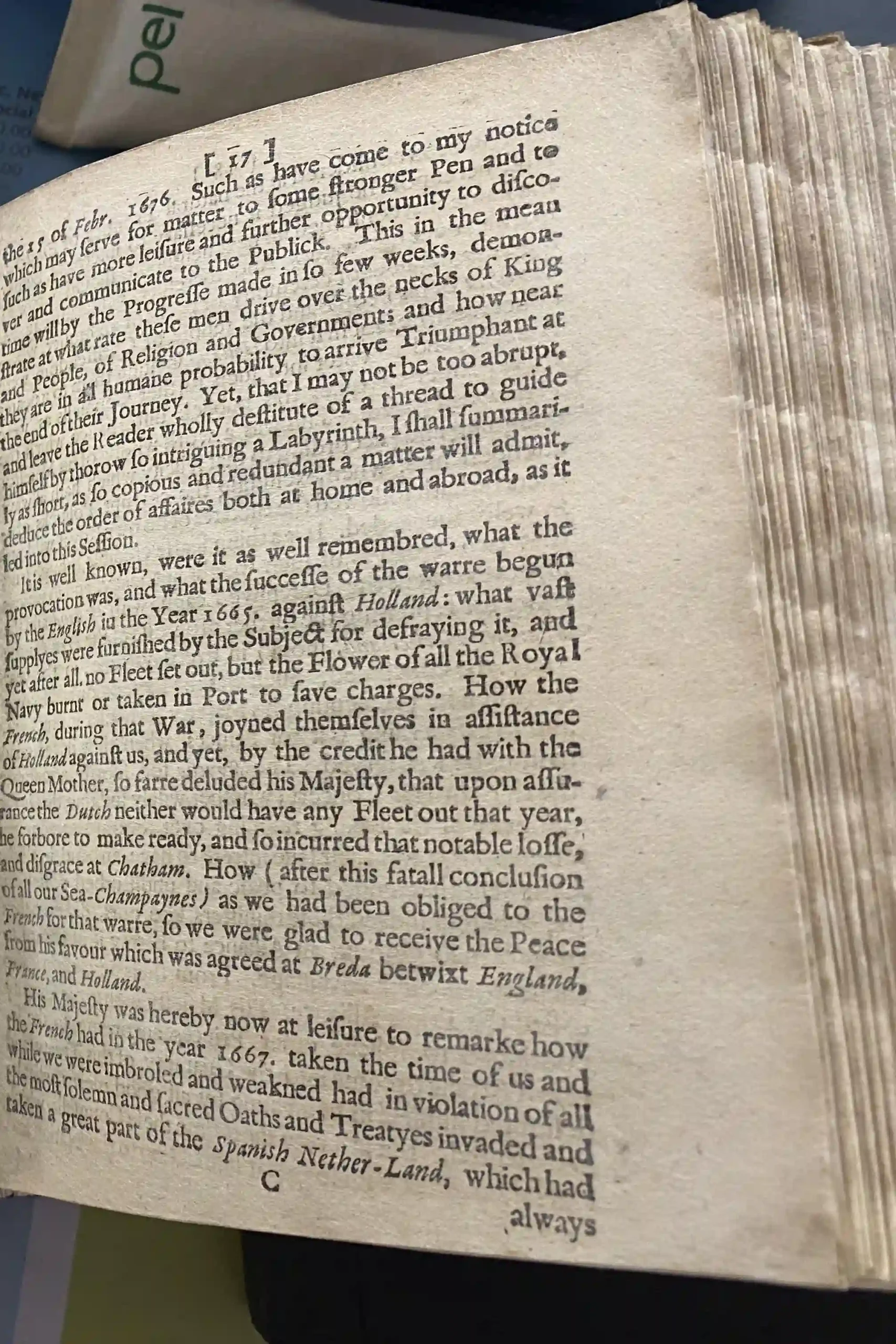
[17]
the 15 of Febr. 1676. Such as have come to my notice
which may serve for matter to some stronger Pen and to
such as have more leisure and further opportunity to disco-
ver and communicate to the Publick. This in the mean
time will by the Progresse made in so few weeks, demon-
strate at what rate these men drive over the necks of King
and People, of Religion and Government: and how near
they are in all humane probability to arrive Triumphant at
the end of their Journey. Yet, that I may not be too abrupt,
and leave the Reader wholly destitute of a thread to guide
himself by thorow so intriguing a Labyrinth, I shall summari-
ly as short, as so copious and redundant a matter will admit,
deduce the order of affaires both at home and abroad, as it
led into this Session.
It is well known, were it as well remembred, what the
provocation was, and what the successe of the warre begun
by the English in the Year 1665. against Holland: what vast
supplyes were furnished by the Subject for defraying it, and
yet after all. no Fleet set out, but the Flower of all the Royal
Navy burnt or taken in Port to save charges. How the
French, during that War, joyned themselves in assistance
of Holland against us, and yet, by the credit he had with the
Queen Mother, so farre deluded his Majesty, that upon assu-
rance the Dutch neither would have any Fleet out that year,
he forbore to make ready, and so incurred that notable losse,
and disgrace at Chatham. How (after this fatall conclusion
of all our Sea-Champaynes) as we had been obliged to the
French for that warre, so we were glad to receive the Peace
from his favour which was agreed at Breda betwixt England,
France, and Holland.
His Majesty was hereby now at leisure to remarke how
the French had in the year 1667. taken the time of us and
while we were imbroled and weakned had in violation of all
the most solemn and sacred Oaths and Treatyes invaded and
taken a great part of the Spanish Nether-Land, which had
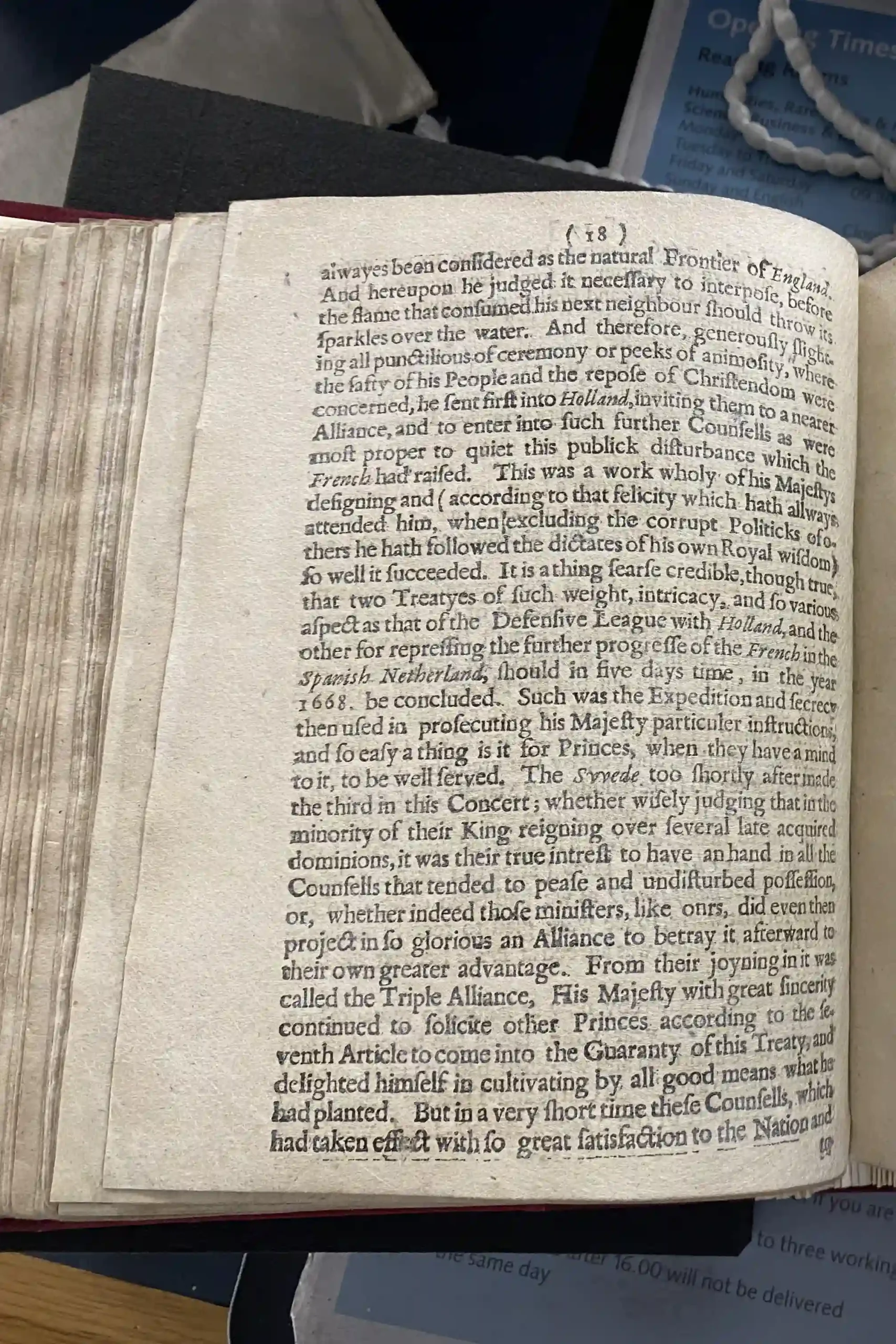
[18]
alwayes been considered as the natural Frontier of England.
And hereupon he judged it necessary to interpose, before
the flame that consumed his next neighbour should throw its
sparkles over the water. And therefore, generously slight-
ing all punctilious of ceremony or peeks of animosity, where
the safty of his People and the repose of Christendom were
concerned, he sent first into Holland, inviting them to a nearer
Alliance, and to enter into such further Counsells as were
most proper to quiet this publick disturbance which the
French had raised. This was a work wholy of his Majestys
designing and ( according to that felicity which hath allways
attended him, when excluding the corrupt Politicks of o-
thers he hath followed the dictates of his own Royal wisdom)
so well it succeeded. It is a thing searse credible, though true,
that two Treatyes of such weight, intricacy, and so various
aspect as that of the Defensive League with Holland, and the
other for repressing the further progresse of the French in the
Spanish Netherland, should in five days time, in the year
1668. be concluded. Such was the Expedition and secrecy
then used in prosecuting his Majesty particuler instructions,
and so easy a thing is it for Princes, when they have a mind
to it, to be well served. The Swede too shortly after made
the third in this Concert; whether wisely judging that in the
minority of their King reigning over several late acquired
dominions, it was their true intrest to have an hand in all the
Counsells that tended to pease and undisturbed possession,
or, whether indeed those ministers, like ours, did even then
project in so glorious an Alliance to betray it afterward to
their own greater advantage. From their joyning in it was
called the Triple Alliance, His Majesty with great sincerity
continued to solicite other Princes according to the se-
venth Article to come into the Guaranty of this Treaty, and
delighted himself in cultivating by all good means what he
had planted. But in a very short time these Counsells, which
had taken effect with so great satisfaction to the Nation and
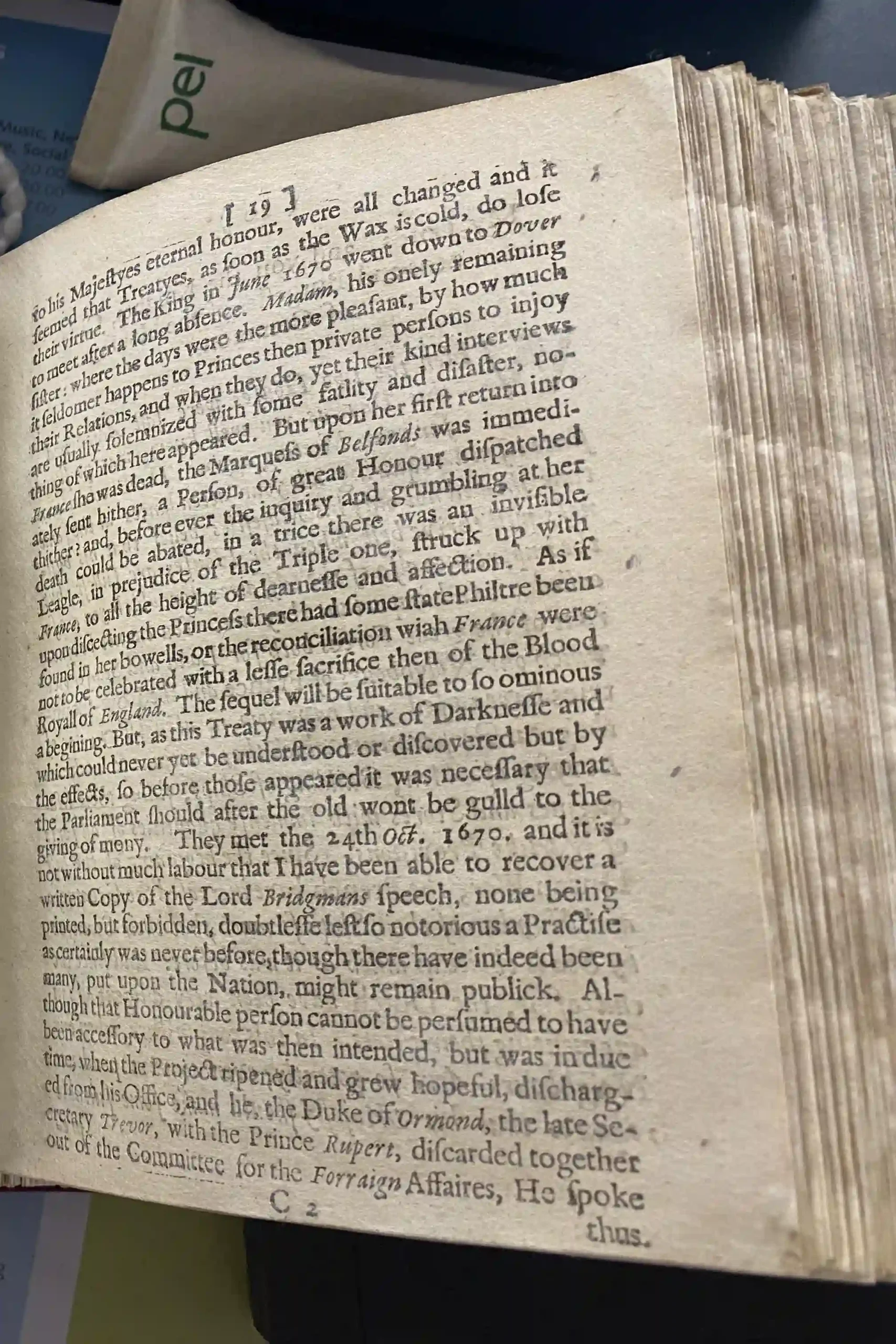
[19]
to his Majestyes eternal honour, were all changed and it
seemed that Treatyes, as soon as the Wax is cold, do lose
their virtue. The King in June 1670 went down to Dover
to meet after a long absence. Madam, his onely remaining
sister: where the days were the more pleasant, by how much
it seldomer happens to Princes then private persons to injoy
their Relations, and when they do, yet their kind interviews
are usually solemnized with some fatlity and disaster, no-
thing of which here appeared. But upon her first return into
France she was dead, the Marquess of Belfonds was immedi-
ately sent hither, a Person, of great Honour dispatched
thither? and, before ever the inquiry and grumbling at her
death could be abated, in a trice there was an invisible
Leagle, in prejudice of the Triple one, struck up with
France, to all the height of dearnesse and affection. As if
upon discecting the Princess there had some state Philtre been
found in her bowells, or the reconciliation wiah France were
not to be celebrated with a lesse sacrifice then of the Blood
Royall of England. The sequel will be suitable to so ominous
a begining. But, as this Treaty was a work of Darknesse and
which could never yet be understood or discovered but by
the effects, so before those appeared it was necessary that
the Parliament should after the old wont be gulld to the
giving of mony. They met the 24th Oct. 1670. and it is
not without much labour that I have been able to recover a
written Copy of the Lord Bridgmans speech, none being
printed, but forbudden, doubtless lest so notorious a Practise
as certainly was never before, though there have indeed been
many, put upon the Nation, might remain publick. Al-
though that Honourable person cannot be persumed to have
been accessory to what was then intended, but was in due
time, when the Project ripened and grew hopeful, discharg-
ed from his Office, and he, the Duke of Ormond, the late Se-
cretary Trevor, with the Prince Rupert, discarded together
out of the Committee for the Forraign Affaires, He spoke
thus.
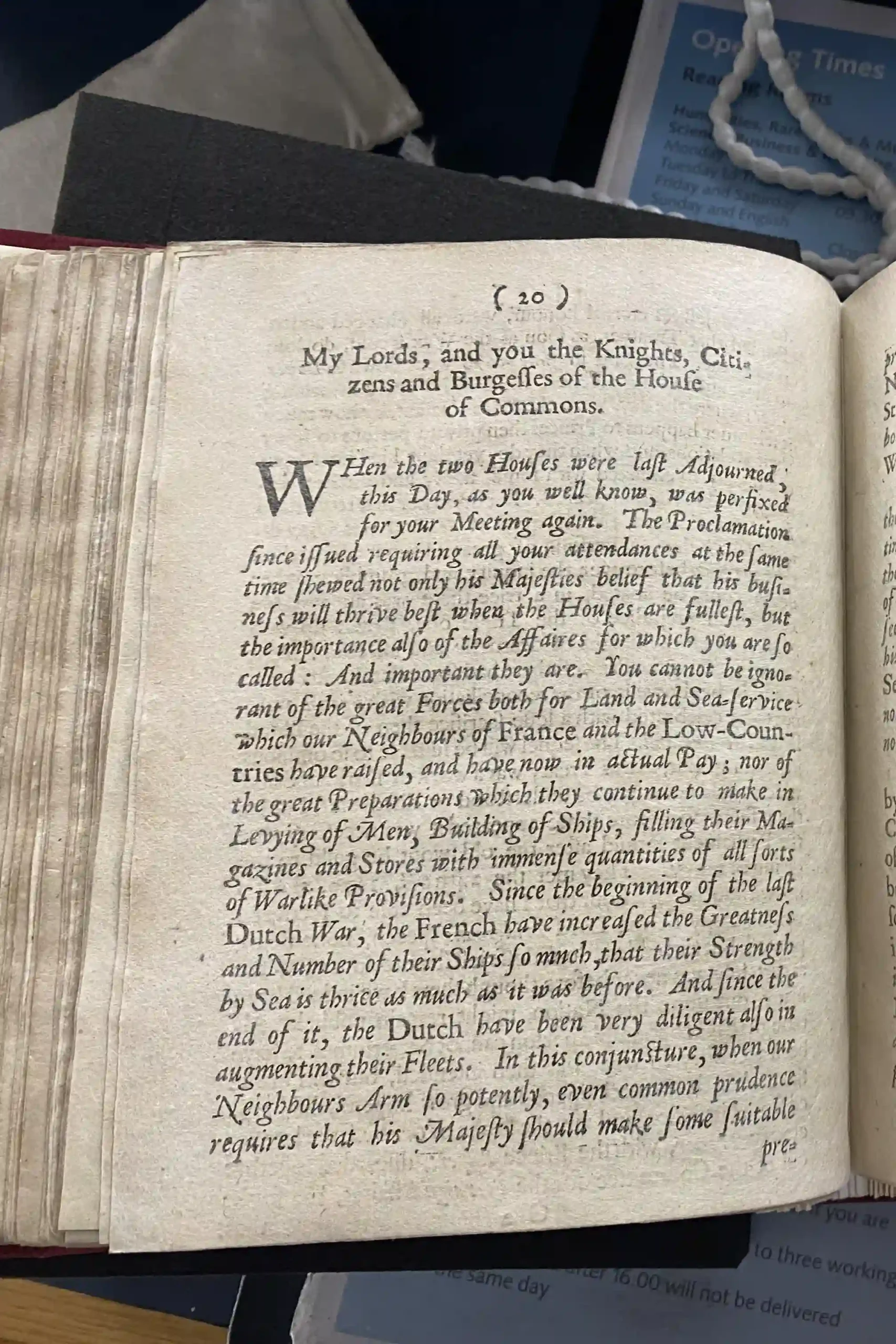
[20]
My Lords, and you the Knights, Citi
zens and Burgesses of the House
of Commons.
WHen the two Houses were last Adjourned,
this Day, as you well known, was perfixed
for your Meeting again. The Proclamation
since issued requiring all your attendances at the same
time shewed not only his Majesties belief that his busi-
ness will thrive best when the Houses are fullest, but
the importance also of the Affaires for which you are so
called: And important they are. You cannot be igno-
rant of the great Forces both for Land and Sea service
which our Neighbours of France and the Low-Coun-
tries have raised, and have now in actual Pay; nor of
the great Preparations which they continue to make in
Levying of Men, Building of Ships, filling their Ma-
gazines and Stores with immense quantities of all sorts
of Warlike Provisions. Since the beginning of the last
Dutch War, the French have increased the Greatness
and Number of their Ships so much, that their Strength
by Sea is thrice as much as it was before. And since the
end of it, the Dutch have been very diligent also in
augmenting their Fleets. In this conjuncture, when our
Neighbours Arm so potently, even common prudence
requires that his Majesty should make some suitable
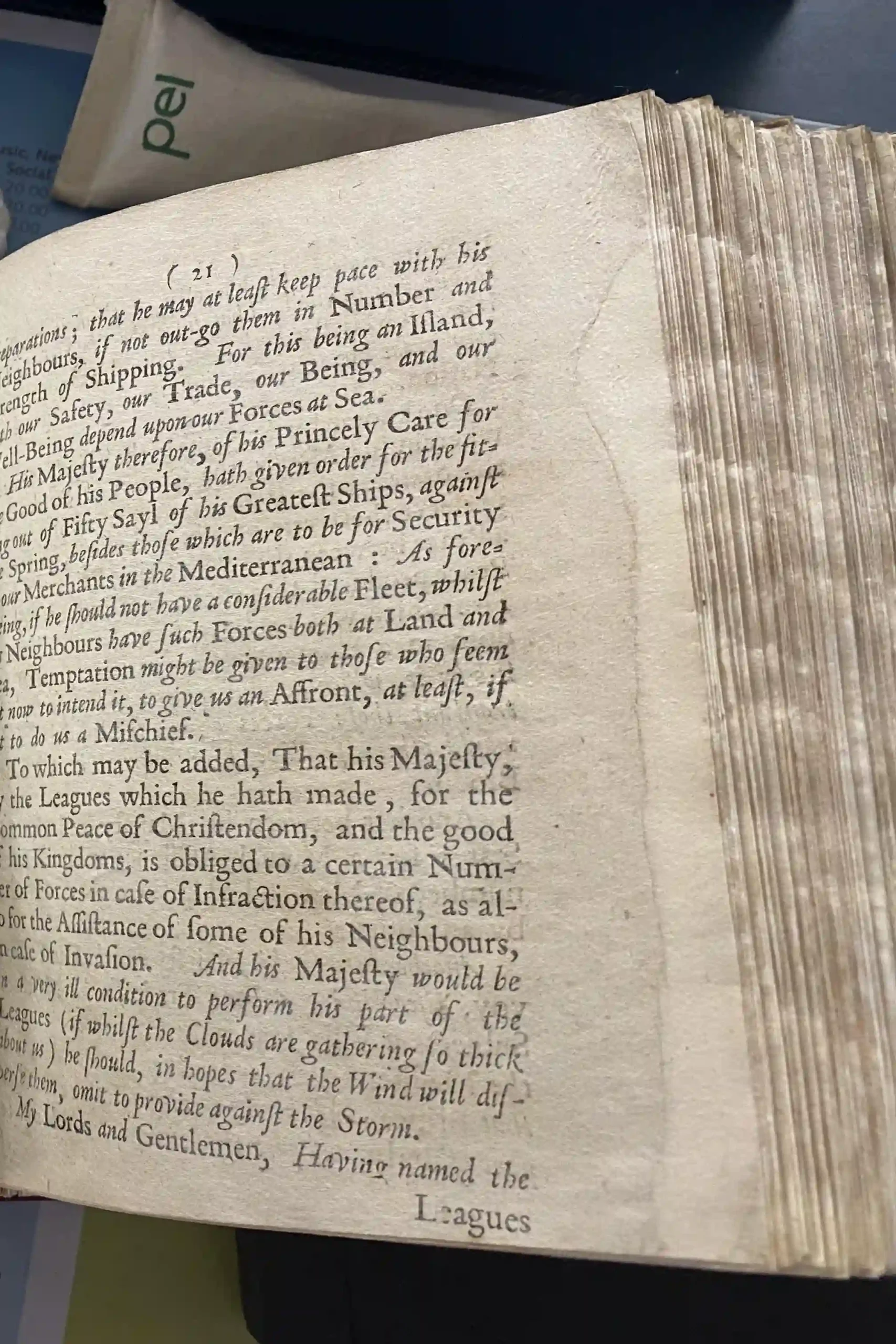
[21]
preparations; that he may at least keep pace with his
Neighbours, if not out-go them in Number and
Strength of Shipping. For this being an Island,
both our Safety, our Trade, our Being, and our
Well-Being depend upon our Forces at Sea.
His Majesty therefore, of his Princely Care for
the Good of his People, hath given order for the fit-
ting out of Fifty Sayl of his Greatest Ships, against
the Spring, besides those which are to be for Security
of our Merchants in the Mediterranean : As fore-
seeing, if he should not have a considerable Fleet, whilst
his Neighbours have such Forces both at Land and
Sea, Temptation might be given to those who seem
not now to intend it, to give us an Affront, at least, if
not to do us a Mischief.
To which may be added, That his Majesty,
by the Leagues which he hath made, for the
Common Peace of Christendom, and the good
of his Kingdoms, is obliged to a certain Num-
ber of Forces in case of Infraction thereof, as al-
so for the Assistance of some of his Neighbours,
in case of Invasion. And his Majesty would be
in a very ill condition to perform his part of the
Leagues (if whilst the Clouds are gathering so thick
about us) he should, in hopes that the Wind will dis-
perse them, omit to provide against the Storm.
My Lords and Gentlemen, Having named the
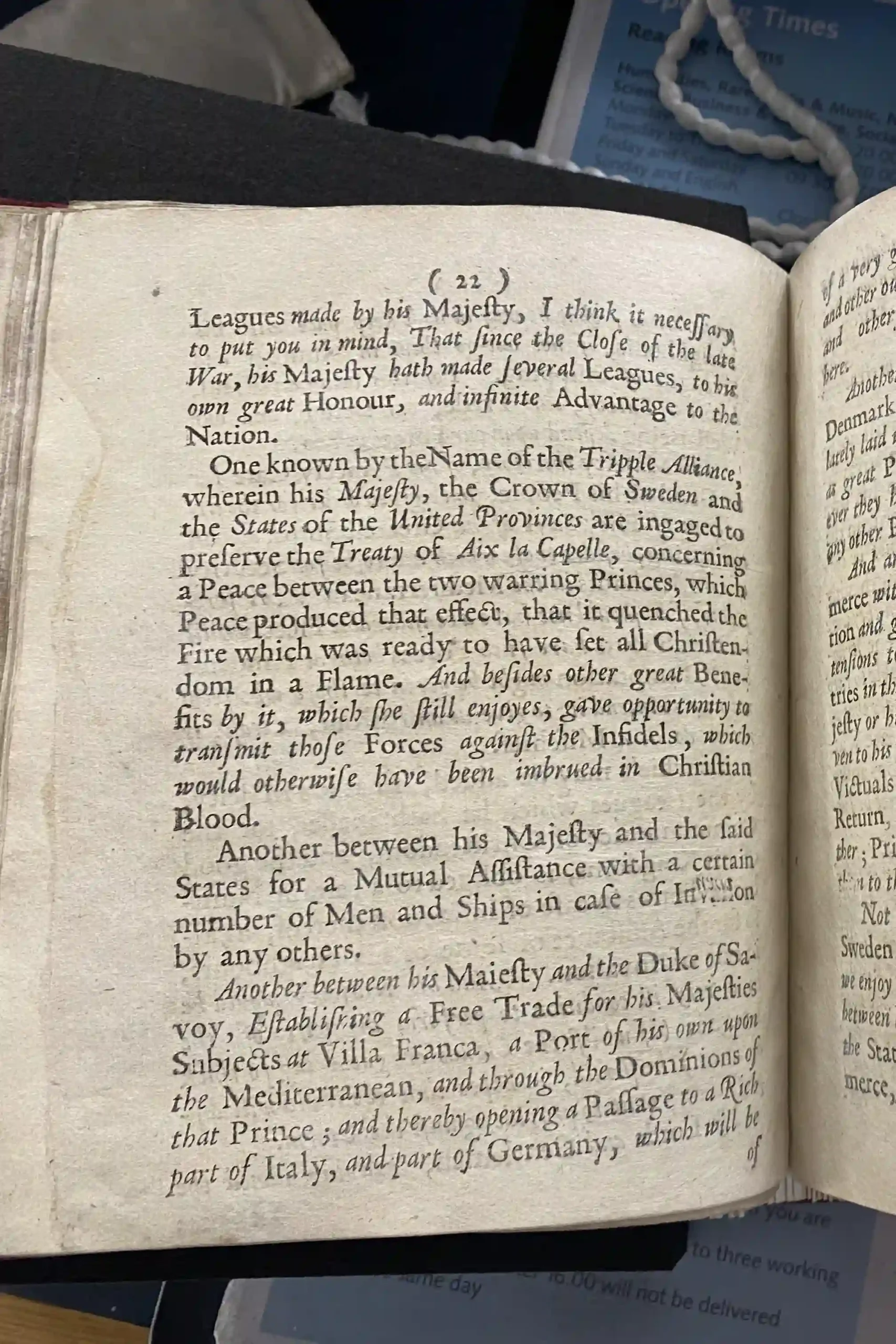
[22]
Leagues made by his Majesty, I think it necessary
to put you in mind, That since the Close of the late
War, his Majesty hath made several Leagues, to his
own great Honour, and infinite Advantage to the
Nation.
One known by the Name of the Tripple Alliance,
wherein his Majesty, the Crown of Sweden and
the States of the United Provinces are ingaged to
preserve the Treaty of Aix la Capelle, concerning
a Peace between the two warring Princes, which
Peace produced that effect, that it quenched the
Fire which was ready to have set all Christen-
dom in a Flame. And besides other great Bene-
fits by it, which she still enjoyes, gave opportunity to
transmit those Forces against the Infidels, which
would otherwise have been imbrued in Christian
Blood.
Another between his Majesty and the said
States for a Mutual Assistance with a certain
number of Men and Ships in case of Invasion
by any others.
Another between his Majesty and the Duke of Sa-
voy, Establishing a Free Trade for his Majesties
Subjects at Villa Franca, a Port of his own upon
the Mediterranean, and through the Dominions of
that Prince; and thereby opening a Passage to a Rich
part of Italy, and part of Germany, which will be
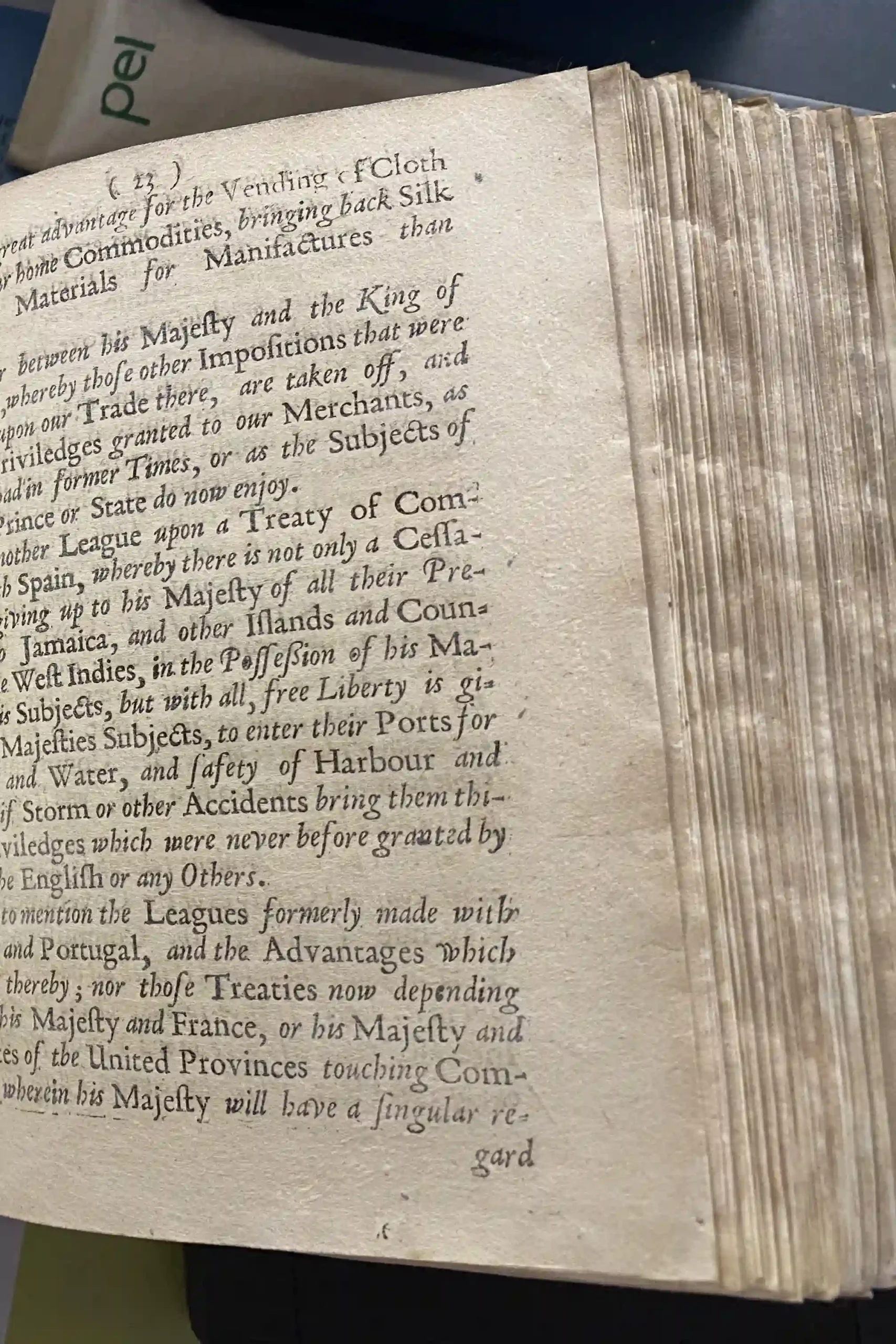
[23]
of a very great advantage for the Vending of Cloth
and other our home Commodities, bringing back Silk
and other Materials for Manifactures than
here.
Another between hisMajesty and the King of
Denmark, whereby those other Impositions that were
lately laid upon our Trade there, are taken off, and
a great Priviledges granted to our Merchants, as
ever they had in former Times, or as the Subjects of
any other Prince or State do now enjoy.
And another League upon a Treaty of Com-
merce with Spain, whereby there is not only a Cessa-
tion and giving up to his Majesty of all their Pre-
tensions to Jamaica, and other Islands and Coun-
tries in the West Indies, in the Possession of his Ma-
jesty or his Majesties Subjects, to enter their Ports for
Victuals and Water, and safety of Harbour and
Return, if Storm or other Accidents bring them thi-
ther; Priviledges which were never before granted by
them to the English or any Others.
Not to mention the Leagues formerly made with
Sweden and Portugal, and the Advantages which
we enjoy thereby; nor those Treaties now depending
between his Majesty and France, or his Majesty and
the States of the United Provinces touching Com-
merce, wherein his Majesty will have a singular re-
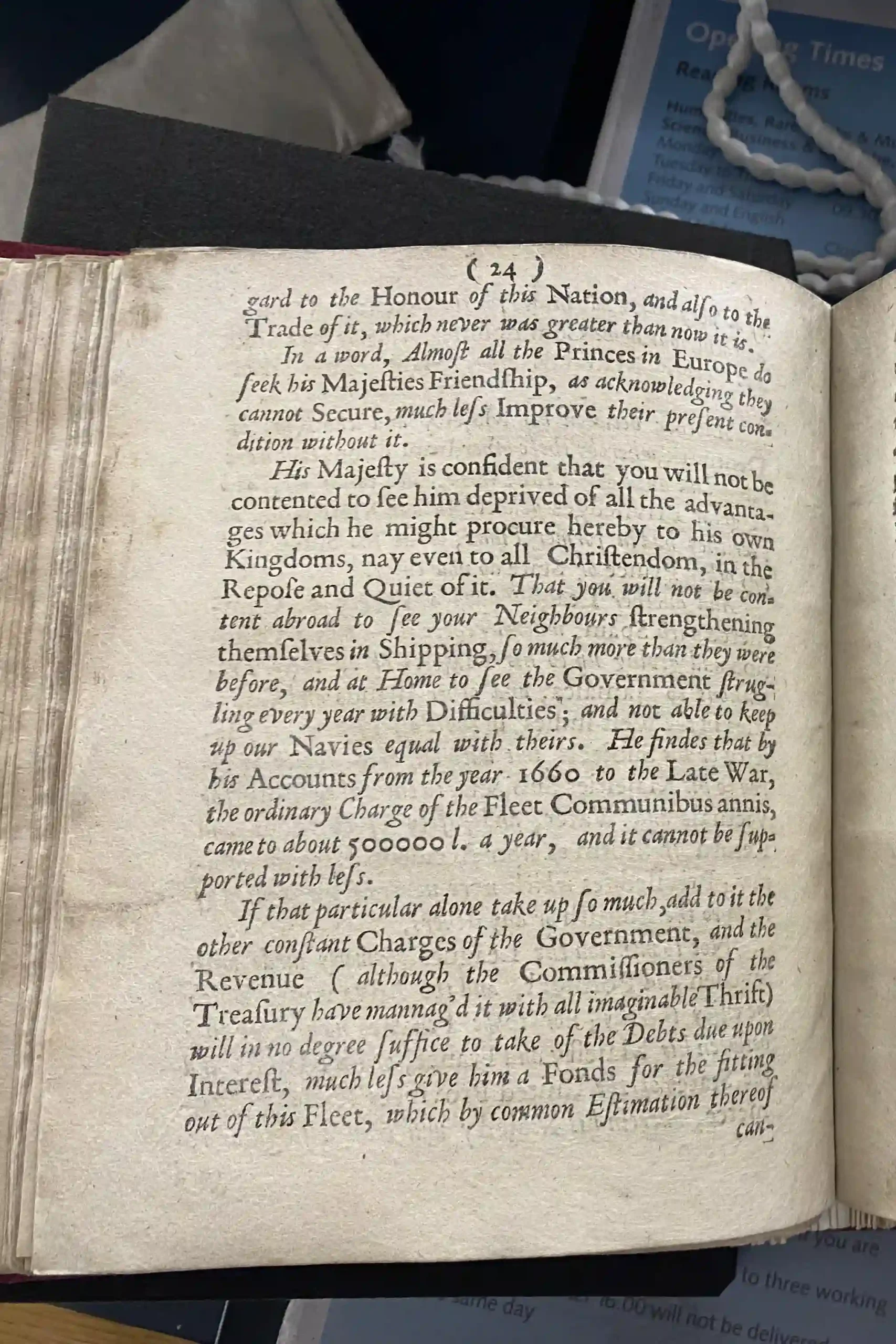
[24]
gard to the Honour of this Nation, and also to the
Trade of it, which never was greater than now it is.
In a word, Almost all the Princes in Europe do
seek his Majesties Friendship, as acknowledging they
cannot Secure, much less Improve their present con-
dition without it.
His Majesty is confident that you will not be
contented to see him deprived of all the advanta-
ges which he might procure hereby to his own
Kingdoms, nay even to all Christendom, in the
Repose and Quiet of it. That you will not be con-
tent abroad to see your Neighbours strengthening
themselves in Shipping, so much more than they were
before, and at Home to see the Government strug-
ling every year with Difficulties: and not able to keep
up our Navies equal with theirs. He findes that by
his Accounts from the year 1660 to the Late War,
the ordinary Charge of the Fleet Communibus annis,
came to about 50000l. a year, and it cannot be sup-
ported with less.
If that particular alone take up so much, add to it the
other constant Charges of the Government, and the
Revenue (although the Commissioners of the
Treasury have mannag`d it with all imaginable Thrift)
will in no degree suffice to take of the Debts due upon
Interest, much less give him a Fonds for the fitting
out of this Fleet, which by common Estimation thereof
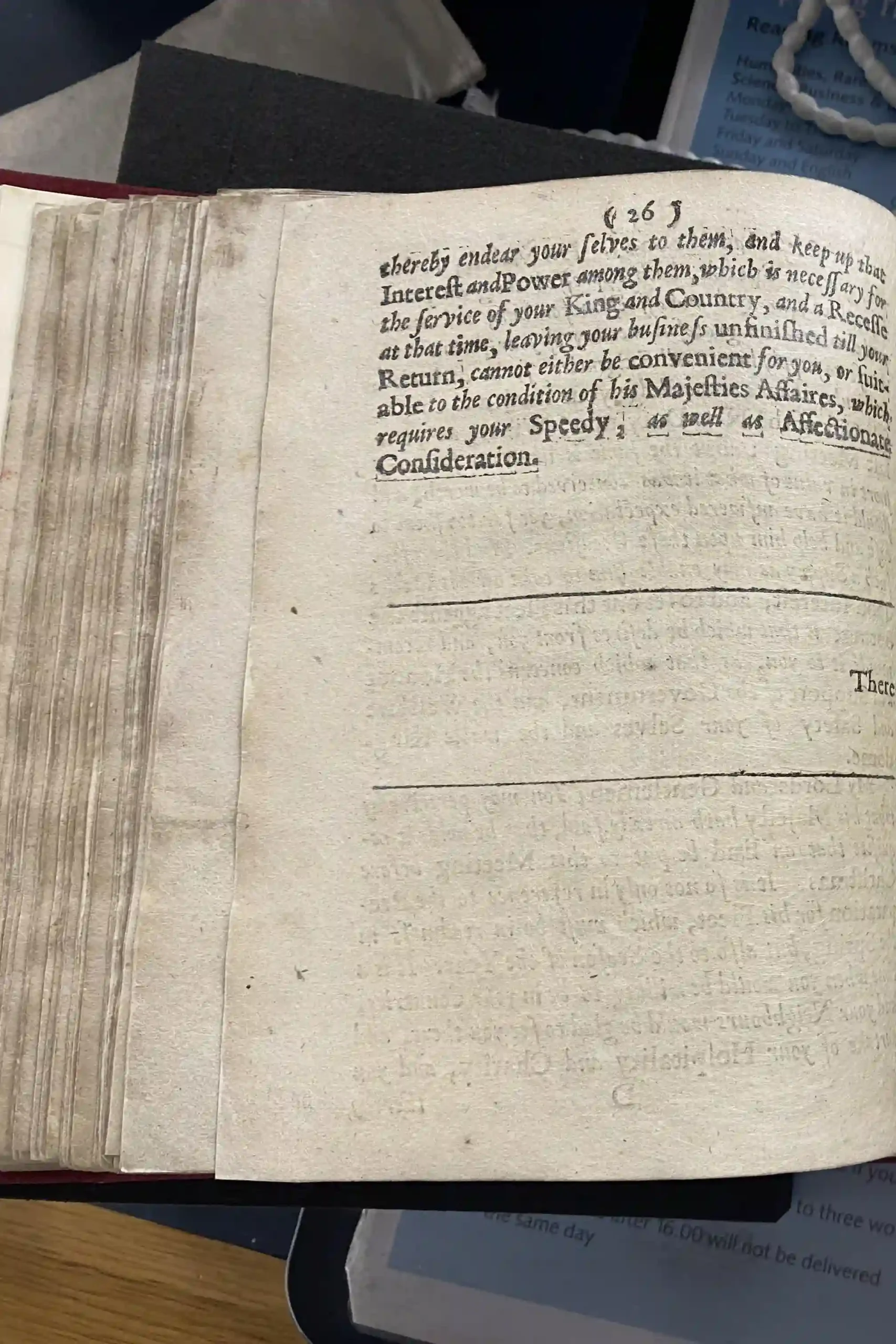
[26]
thereby endear your selves to them, and keep up that
Interest and Power among them, which is necessary for
the service of your King and Country, and a Recesse
at that time, leaving your business unfinished till your
Return, cannot either be convenient for you, or suit-
able to the condition of his Majesties Affairs, which
requires your Speedy, as well as Affectionate
Consideration.
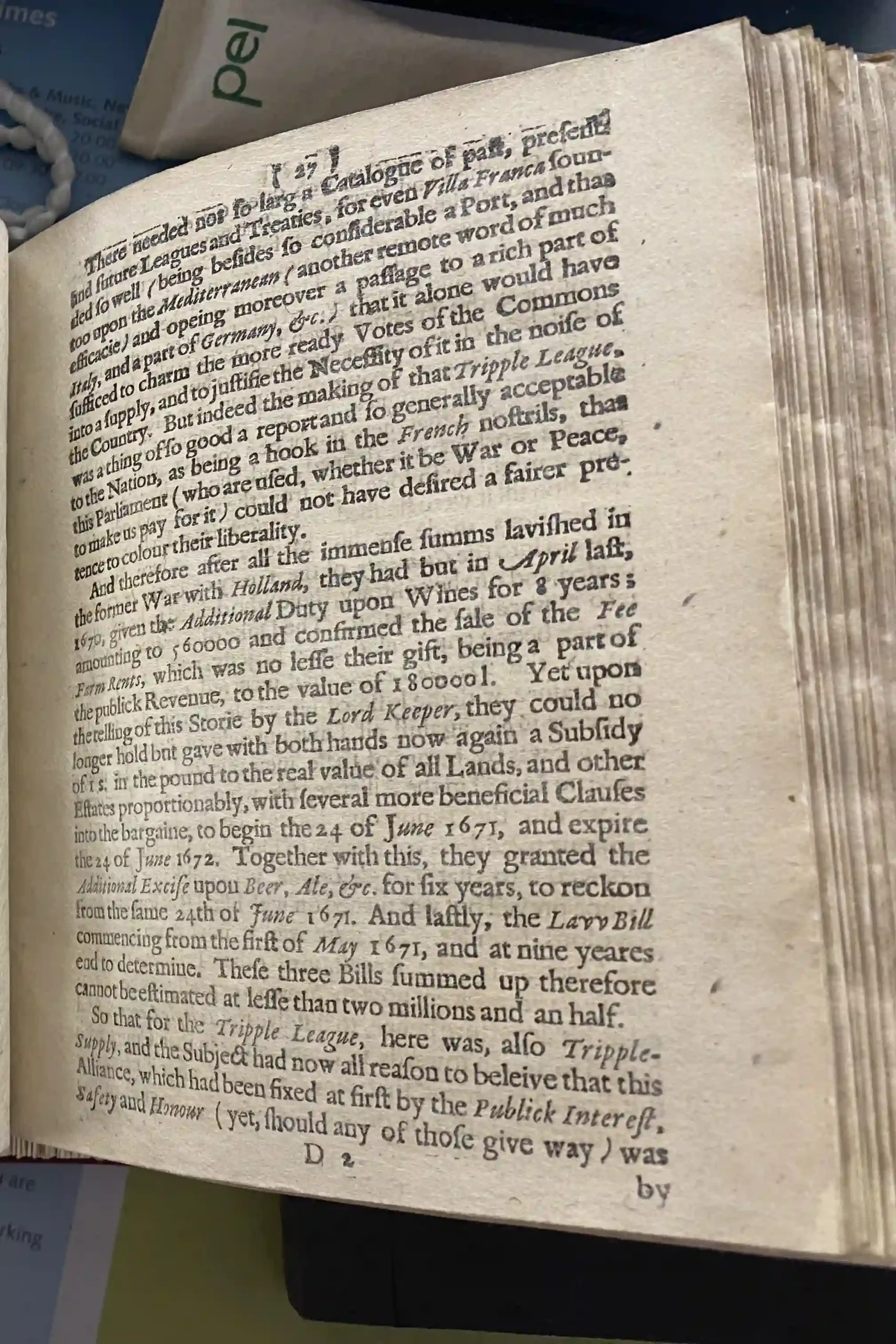
[27]
There needed not so larg a Catalogue of past, present
and future Leagues and Treaties, for even Villa Franca soun-
ded so well (being besides so considerable a Port, and thas
too upon the Mediterranean (another remote word of much
efficacie) and opeing moreover a passage to a rich part of
Italy, and a part of Germany, &c.) that it alone would have
sufficed to charm the more ready Votes of the Commons
into a supply, and to justifie the Necessity of it in the noise of
the Country. But indeed the making of that Tripple League,
was a thing of so good a report and so generally acceptable
to the Nation, as being a hook in the French nostrils, than
this Parliament (who are used, whether it be War or Peace,
to make us pay for it ) could not have desired a fairer pre-
tence to colour their liberality.
And therefore after all the immense summs lavished in
the former War with Holland, they had but in April last,
1670, given the Additional Duty upon Wines for 8 years;
amounting to 560000 and confirmed the sale of the Fee
Farm Rents, which was no lesse their gift, being a part of
the publick Revenue, to the value of 180000l. Yet upon
the telling of this Storie by the Lord Keeper, they could no
longer hold but gave with both hands now again a Subsidy
of 1 s. in the pound to the real value of all Lands, and other
Estates proportionably, with several more beneficial Clauses
into the bargaine, to begin the 24 of June 1671, and expire
the 24 of June 1672. Together with this, they granted the
Additional Excise upon Beer, Ale, &c. for six years, to reckon
from the same 24th of June 1671. And lastly, the Law Bill
commencing from the first of May 1671, and at nine yeares
end to determine. These three Bills summed up therefore
cannot be estimated at lesse than two millions and an half.
So that for the Tripple League, here was, also Tripple-
Supply, and the Subject had now all reason to beleive that this
Alliance, which had been fixed at first by the Publick Interest,
Safety and Honour (yet should any of those give way) was
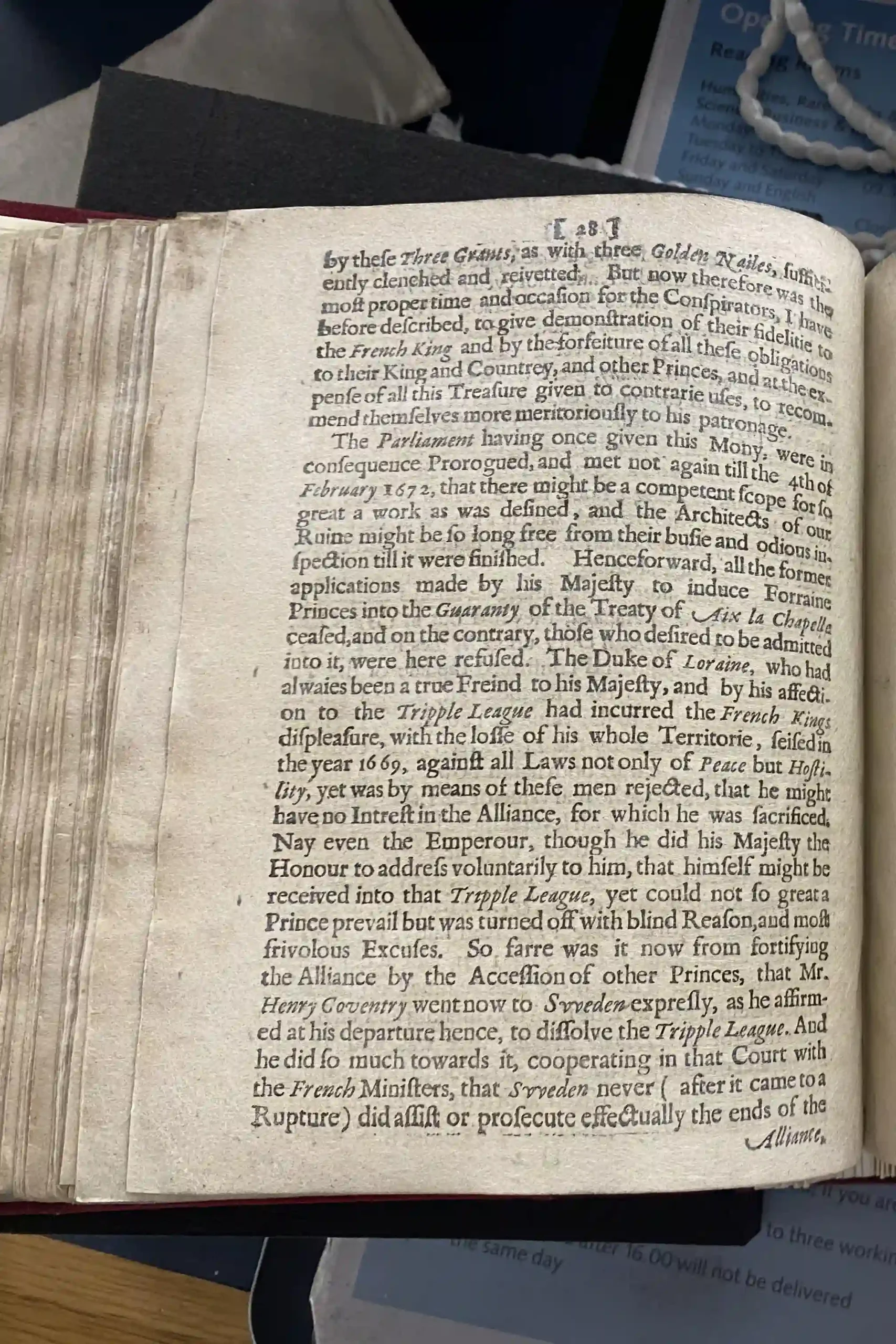
[ 28 ]
by these Three Grants, as with three Golden Nailes, suffici-
ently clenched and reivetted. But now therefore was the
most proper time and occasion for the Conspirators I have
before described, to give demonstration of their fidelitie to
the French King and by the forfeiture of all these obligations
to their King and Countrey, and other Princes, and at the ex-
pense of all this Treasure given to contraries uses, to recom-
mend themselves more meritoriously to his patronage.
The Parliament having once given this Mony, were in
consequence Prorogued, and met not again till the 4th of
February 1672, that there might be a competent scope for so
great a work as was defined, and the Architects of our
Ruine might be so long free from their busie and odious in-
spection till it were finished. Henceforward, all the former
applications made by his Majesty to induce Forraine
Princes into the Guaranty of the Treaty of Aix la Chapelle
ceased, and on the contrary, those who desired to be admitted
into it, were here refused. The Duke of Loraine, who had
alwaies been a true Freind to his Majesty, and by his affecti-
on to the Tripple League had incurred the French Kings
displeasure, with the losse of his whole Territorie, seised in
the year 1669, against all Laws not only of Peace but Hosti-
lity, yet was by means of these men rejected, that he might
have no Intrest in the Alliance, for which he was sacrificed.
Nay even the Emperour, though he did his Majesty the
Honour to address voluntarily to him, that himself might be
received into that Tripple League, yet could not so great a
Prince prevail but was turned off with blind Reason, and most
frivolous Excuses. So farre was it now from fortifying
the Alliance by the Accession of other Princes, that Mr.
Henry Coventry went now to Sweden expresly, as he affirm-
ed at his departure hence, to dissolve the Tripple League. And
he did so much towards it, cooperating in that Court with
the French Ministers, that Sweden never ( after it came to a
Rupture ) did assist or prosecute effectually the ends of the
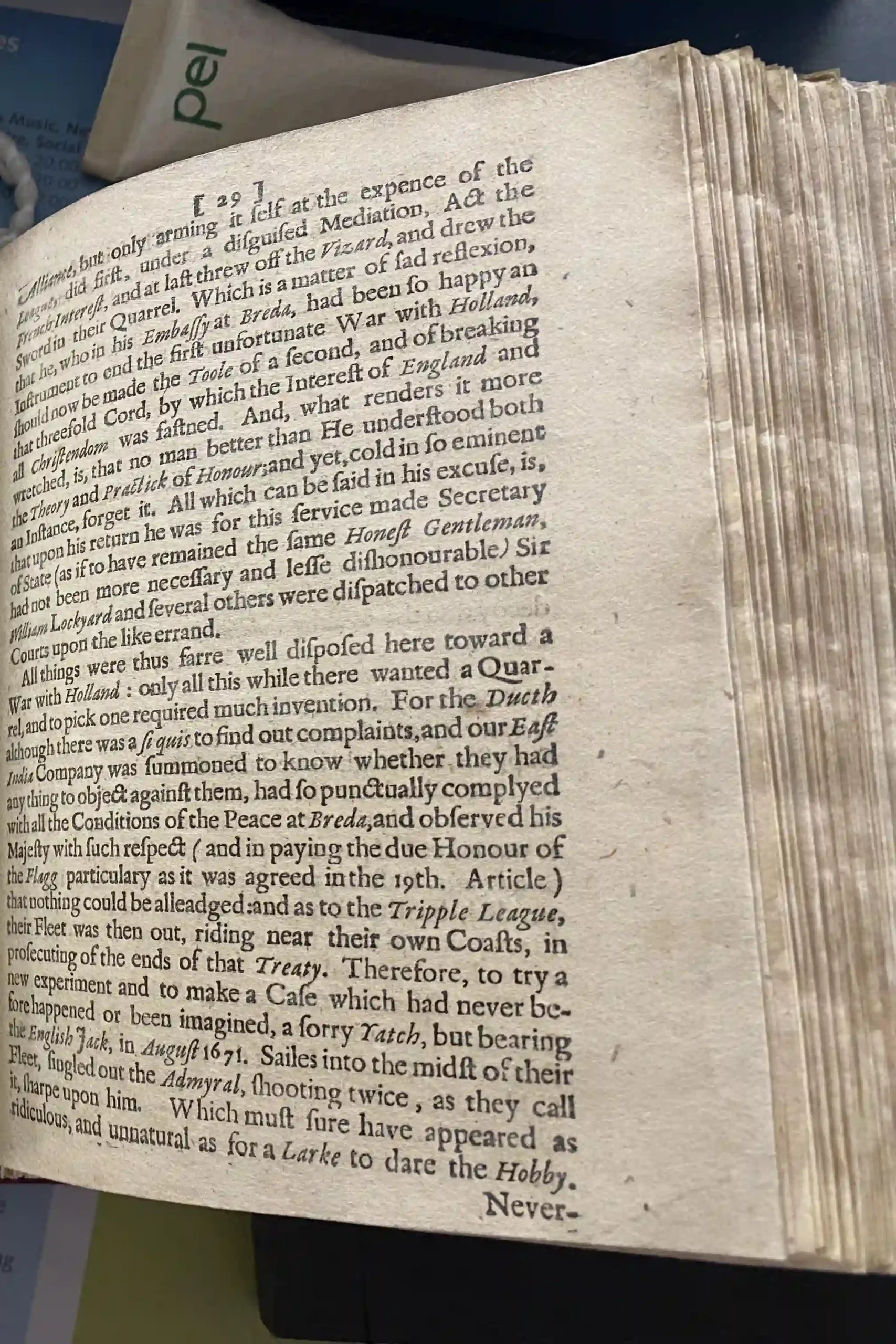
[ 29 ]
Alliance, but only arming it self at the expence of the
Leagues did first, under a disguised Mediation, Act the
French Interest, and at last threw off the Vizard, and drew the
Sword in their Quarrel. Which is a matter of sad reflexion,
that he, who in his Embassy at Breda, had been so happy an
Instrument to end the first unfortunate War with Holland,
should now be made the Toole of a second, and of breaking
that threefold Cord, by which the Interest of England and
all Christendom was fastned. And, what renders it more
wretched, is, that no man better than He understood both
the Theory and Practick of Honour, and yet, cold in so eminent
an Instance, forget it. All which can be said in his excuse, is,
that upon his return he was for this service made Secretary
of State (as if to have remained the same Honest Gentleman,
had not been more necessary and lesse dishonourable) Sir
William Lockyard and several others were dispatched to other
Courts upon the like errand.
All things were thus farre well disposed here toward a
War with Holland: only all this while there wanted a Quar-
rel, and to pick one required much invention. For the Dutch
although there was a si quis to find out complaints, and our East
India Company was summoned to know whether they had
any thing to object against them, had so punctually complyed
with all the Conditions of the Peace at Breda, and observed his
Majesty with such respect (and in paying the due Honour of
the Flagg particulary as it was agreed in the 19th. Article)
that nothing could be alleadged: and as to the Tripple League,
their Fleet was then out, riding near their own Coasts, in
prosecuting of the ends of that Treaty. Therefore, to try a
new experiment and to make a Case which had never be-
fore happened or been imagined, a sorry Yatch, but bearing
the English Jack, in August 1671. Sailes into the midst of their
Fleet, singled out the Admyral, shooting twice, as they call
it, sharpe upon him. Which must sure have appeared as
ridiculous, and unnatural as for a Larke to dare the Hobby.
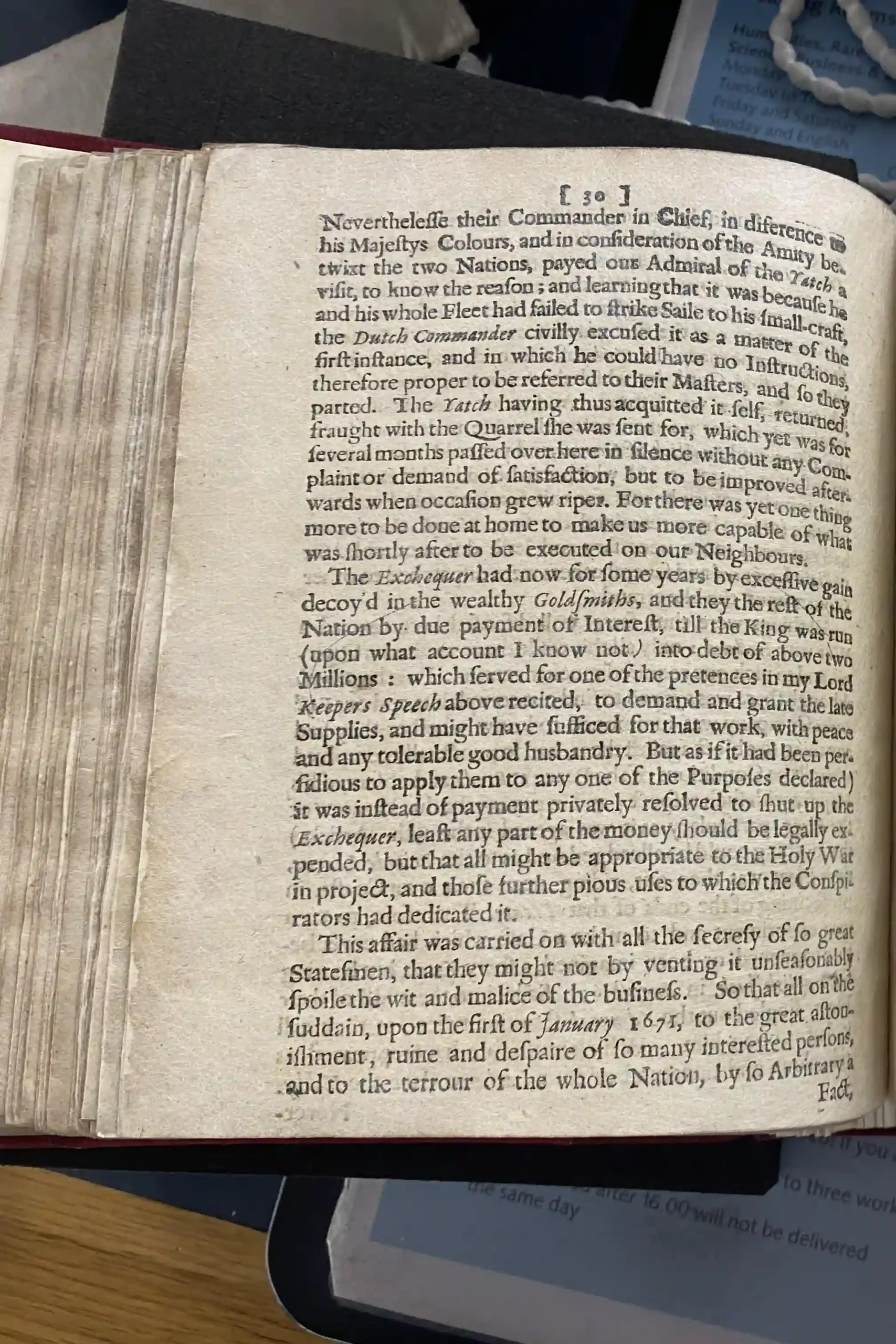
[ 30 ]
Neverthelesse their Commander in Chief, in diference to
his Majestys Colours, and in consideration of the Amity be-
twixt the two Nations, payed our Admiral of the Yatch a
visit, to know the reason; and learning that it was because he
and his whole Fleet had failed to strike Saile to his small-craft,
the Dutch Commander civilly excused it as a matter of the
first instance, and in which he could have no Instructions,
therefore proper to be referred to their Masters, and so they
parted. The Yatch having thus acquitted it self, returned,
fraught with the Quarrel she was sent for, which yet was for
several months passed over here in silence without any Com-
plaint or demand of satisfaction, but to be improved after-
wards when occasion grew ripe. For there was yet one thing
more to be done at home to make us more capable of what
was shortly after to be executed on our Neighbours.
The Exchequer had now for some years by excessive gain
decoy’d in the wealthy Goldsmiths, and they the rest of the
Nation by due payment of Interest, till the King was run
(upon what account I know not) into debt of above two
Millions : which served for one of the pretences in my Lord
Keepers Speech above recited, to demand and grant the late
Supplies, and might have sufficed for that work, with peace
and any tolerable good husbandry. But as if it had been per-
fidious to apply them to any one of the Purposes declared)
it was instead of payment privately resolved to shut up the
Exchequer, least any part of the money should be legally ex-
pended, but that all might be appropriate to the Holy War
in project, and those further pious uses to which the Conspi-
rators had dedicated.
This affair was carried on with all the secrecy of so great
Statesmen, that they might not by venting it unseasonably
spoile the wit and malice of the business. So that all on the
suddain, upon the first of January 1671, to the great aston-
ishment, ruine and despaire of so many interested persons,
and to the terrour of the whole Nation, by so Arbitrary a
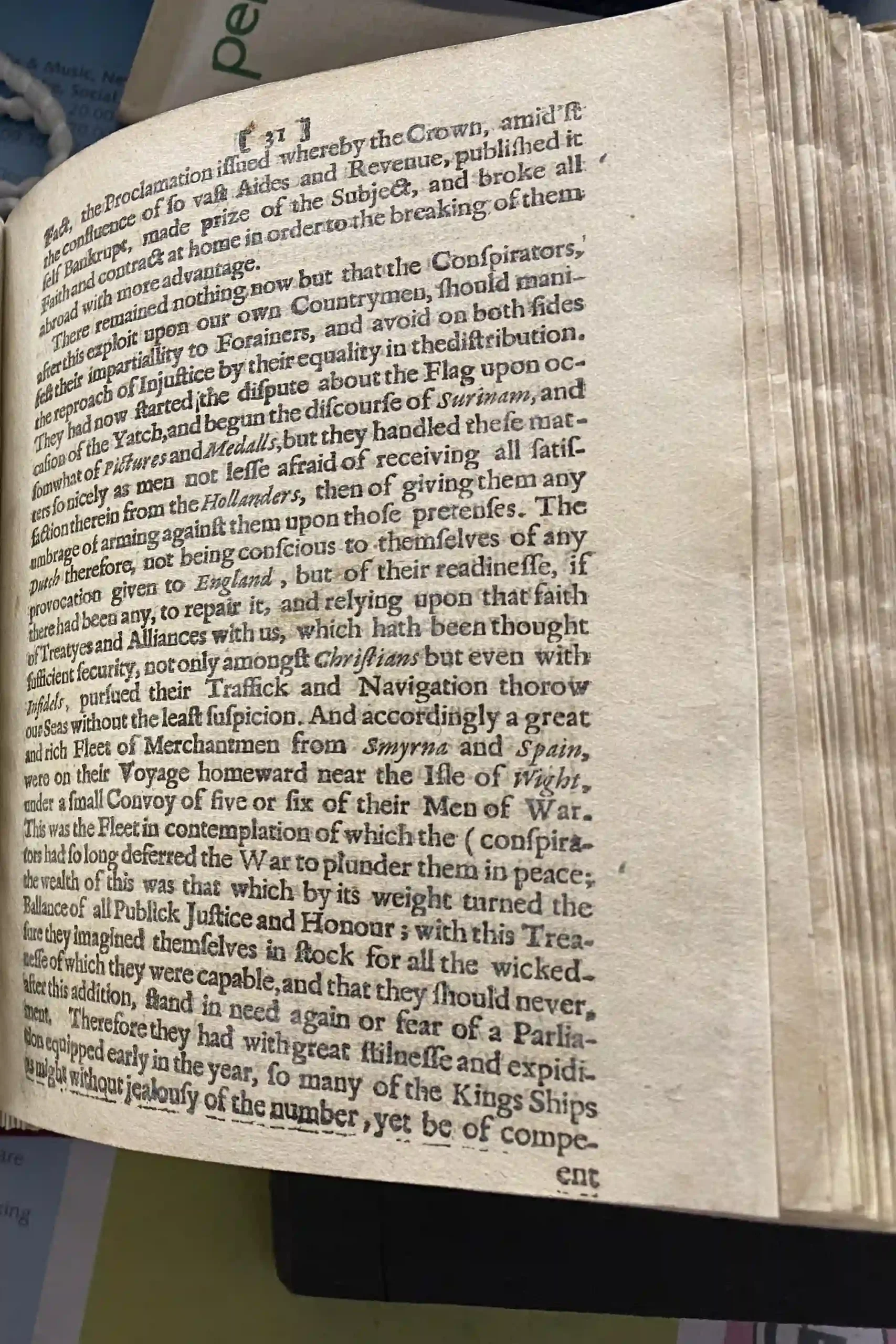
[ 31 ]
Fact, the Proclamation issued whereby the Crown, amidist
the confluence of so vast Aides and Revenue, published it
self Bankrupt, made prize of the Subject, and broke all
Faith and contract at home in order to the breaking of them
abroad with more advantage.
There remained nothing now but that the Conspirators,
after this exploit upon our own Countrymen, should mani-
fest their impartiallity to Forainers, and avoid on both sides
the reproach of Injustice by their equality in the distribution.
They had now started the dispute about the Flag upon oc-
casion of the Yatch, and begun the discourse of Surinam, and
somewhat of Pictures and Medalls, but they handled these mat-
ters so nicely as men not lesse afraid of receiving all satis-
faction therein from the Hollanders, then of giving them any
umbrage of arming against them upon those pretenses. The
Dutch therefore, not being conscious to themselves of any
provocation given to England, but of their readinesse, if
there had been any, to repair it, and relying upon that faith
of Treatyes and Alliances with us, which hath been thought
sufficient security, not only amongst Christians but even with
Infidels, pursued their Traffick and Navigation thorow
our Seas without the least suspicion. And accordingly a great
and rich Fleet of Merchantmen from Smyrna and Spain,
were on their Voyage homeward near the Isle of Wight,
under a small Convoy of five or six of their Men of War.
This was the Fleet in contemplation of which the ( conspira-
tors had so long deferred the War to plunder them in peace;
the wealth of this was that which by its weight turned the
Ballance of all Publick Justice and Honour; with their Trea-
sure they imagined themselves in stock for all the wicked-
nesse of which they were capable, and that they should never,
after this addition, stand in need again or fear of a Parlia-
ment. Therefore they had with great stilnesse and expidi-
tion equipped early in the year, so many of the Kings Ships
as might without jealousy of the number, yet be of compe-

[ 31 ]
Fact, the Proclamation issued whereby the Crown, amidist
the confluence of so vast Aides and Revenue, published it
self Bankrupt, made prize of the Subject, and broke all
Faith and contract at home in order to the breaking of them
abroad with more advantage.
There remained nothing now but that the Conspirators,
after this exploit upon our own Countrymen, should mani-
fest their impartiallity to Forainers, and avoid on both sides
the reproach of Injustice by their equality in the distribution.
They had now started the dispute about the Flag upon oc-
casion of the Yatch, and begun the discourse of Surinam, and
somewhat of Pictures and Medalls, but they handled these mat-
ters so nicely as men not lesse afraid of receiving all satis-
faction therein from the Hollanders, then of giving them any
umbrage of arming against them upon those pretenses. The
Dutch therefore, not being conscious to themselves of any
provocation given to England, but of their readinesse, if
there had been any, to repair it, and relying upon that faith
of Treatyes and Alliances with us, which hath been thought
sufficient security, not only amongst Christians but even with
Infidels, pursued their Traffick and Navigation thorow
our Seas without the least suspicion. And accordingly a great
and rich Fleet of Merchantmen from Smyrna and Spain,
were on their Voyage homeward near the Isle of Wight,
under a small Convoy of five or six of their Men of War.
This was the Fleet in contemplation of which the ( conspira-
tors had so long deferred the War to plunder them in peace;
the wealth of this was that which by its weight turned the
Ballance of all Publick Justice and Honour; with their Trea-
sure they imagined themselves in stock for all the wicked-
nesse of which they were capable, and that they should never,
after this addition, stand in need again or fear of a Parlia-
ment. Therefore they had with great stilnesse and expidi-
tion equipped early in the year, so many of the Kings Ships
as might without jealousy of the number, yet be of compe-
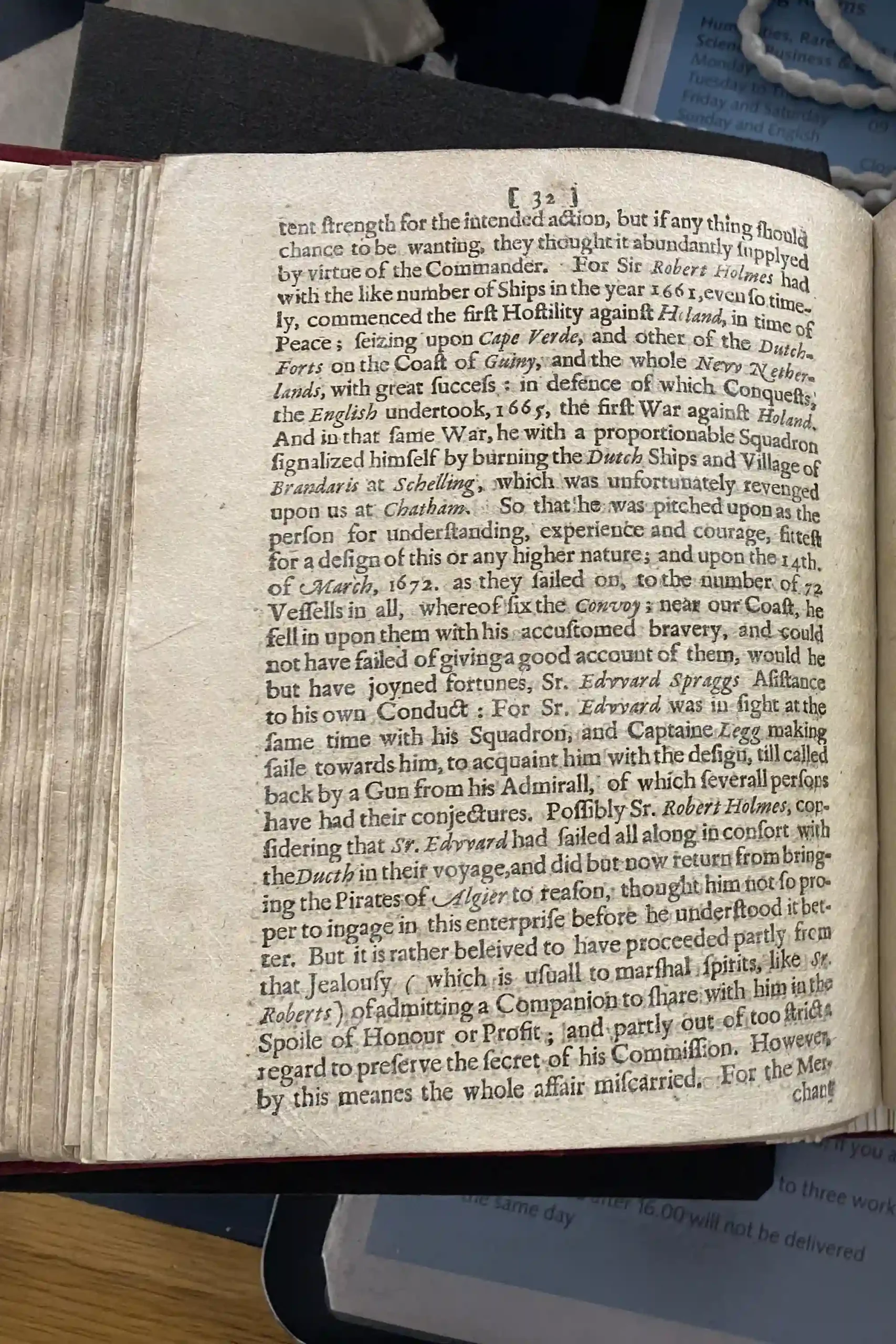
[ 32 ]
tent strength for the intended action, but if any thing should
chance to be wanting, they thought it abundantly supplyed
by virtue of the Commander. For Sir Robert Holmes had
with the like number of Ships in the year 1661, even so time-
ly, commenced the first Hostility against Holand, in time of
Peace; seizing upon Cape Verde, and other of the Dutch-
Forts on the Coast of Guiny, and the whole New Nether-
lands, with great success : in defence of which Conquests,
the English undertook, 1665, the first war against Holand.
And in that same War, he with a proportionable Squadron
signalized himself by burning the Dutch Ships and Village of
Brandaris at Schelling, which was unfortunately revenged
upon us at Chatham. So that he was pitched upon as the
person for understanding, experience and courage, fittest
for a design of this or any higher nature; and upon the 14th.
of March, 1672. as they sailed on, to the number of 72
Vessells in all, whereof six the Convoy; near our Coast, he
fell in upon them with his accustomed bravery, and could
not have failed of giving a good account of them, would he
but have joyned fortunes, Sr. Edward Spraggs Assistancce
to his own Conduct: For Sr. Edward was in sight at the
same time with his Squadron, and Captaine Legg making
saile towards him, to acquaint him with the design, till called
back by a Gun from his Admirall, of which severall persons
have had their conjectures. Possibly Sr. Robert Holmes, con-
sidering that Sr. Edward had sailed all along in consort with
the Dutch in their voyage, and did but now return from bring-
ing the Pirates of Algier to reason, though him not so pro-
per to ingage in their enterprise before he understood it bet-
ter. But it is rather beleived to have proceeded partly from
that Jealousy ( which is usuall to marshal spirits, like Sr.
Roberts) of admitting a Companion to share with him in the
Spoile of Honour or Profit; and partly out of too strict a
regard to preserve the secret of his Commission. However,
by this meanes the whole affair miscarried. For the Mer-
chant
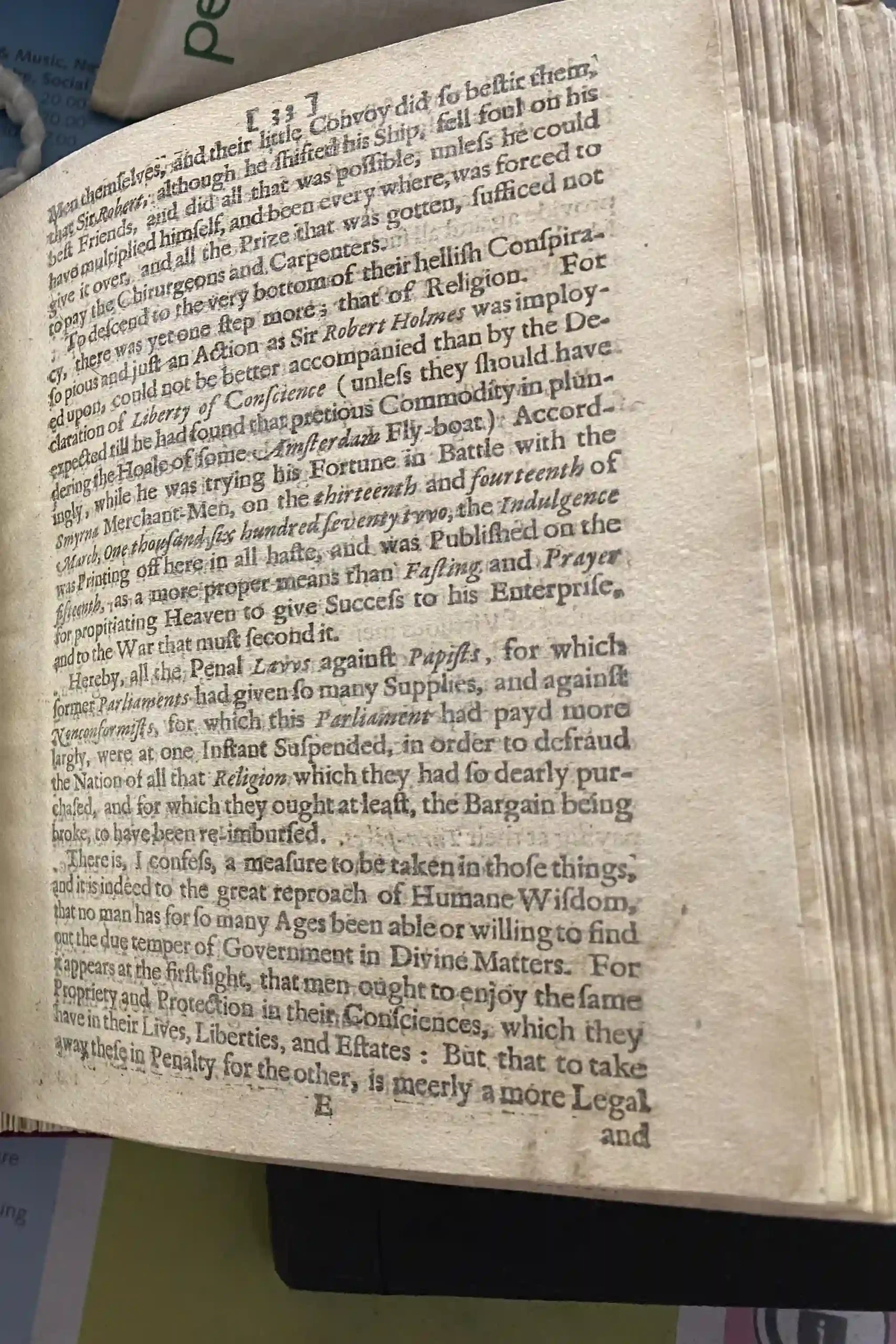
[ 33 ]
Men themselves, and their little Convoy did so bestir them,
that Sir Robert, although he shifted his Ship, fell foul on his
best Friends, and did all that was possible, unless he could
have multiplied himself, and been everywhere, was forced to
give it over, and all the Prize that was gotten, sufficed not
to pay the Chirurgeons and Carpenters.
To descend to the very bottom of their hellish Conspira-
cy, there was yet one step more; that of Religion. For
so pious and just an Action as Sir Robert Holmes was imploy-
ed upon, could not be better accompanied than by the De-
claration of Liberty of Conscience ( unless they should have
expected till he had found that precious Commodity in plun-
dering the Hoale of some Amsterdam Fly-boat) According-
ingly, while he was trying his Fortune in Battle with the
Smyrna Merchant-Men, on the thirteenth and fourteenth of
March, One thousand six hundred seventy two, the Indulgence
was Printing off here in all haste, and was Published on the
fifteenth, as a more proper means than Fasting and Prayer
for propitiating Heaven to give Success to his Enterprise,
and to the War that must second it.
Hereby, all the Penal Laws against Papists, for which
former Parliaments had given so many Supplies, and against
Nonconformists, for which this Parliament had payd more
largly, were at one Instant Suspended, in order to defraud
the Nation of all that Religion which they had so dearly pur-
chased, and for which they ought at least, the Bargain being
broke, to have been re-imbursed.
There is, I confess, a mesure to be taken in those things,
and it is indeed to the great reproach of Humane Wisdom,
that no many has for so many Ages been able or willing to find
out the due temper of Government in Divine Matters. For
it appears at the first sight, that men ought to enjoy the same
Propriety and Protection in their Consciences, which they
have in their Lives, Liberties, and Estates: But that to take
away these in Penalty for the other, is meerly a more Legal
Footnotes
- *persuasion